#also yes maybe i read into the len thing a little too much but narrative wise i think he'd make an interesting foil to heron
Note
Do you have any hcs for Heron???
how did you catch me thinking abt him... spooky
i'm like super bad at listing hcs out in an organized manner (*_ _)人 but here's some:
goes for long walks at night to clear his mind when he can't sleep. yeah walking around the dark alone at like 2 in the morning probably isn't the safest thing but he prefers the solitude at that time of day. occasionally he'll also find something like a cool rock or shell or whatever on these walks to bring back and gift to one of his friends (or just keep for himself)
occasionally tries to hide his emotions so those close to him won't worry about him, but he's not actually very good at that (sometimes) and it just makes them worry more :'0. also, very prone to mood swings, which he also tries to hide as to not ruin the mood [pun was not intended i swear]
please don't let him wear roller skates/heelys - he says he'll be fine and knows how to use them but he crashes into everything and nearly breaks his bones 😭
he and oliver don't actually talk all that much but there is a silent mutual understanding (bird instincts 🤝)
used to have a higher cold tolerance prior to losing his hand (& eye), but can't risk being out in the cold as much anymore due to the mechanical parts possibly getting damaged (& the metal gets freezing which is. uncomfortable) so :( rip
scared of the dentist but only a little bit. not completely terrified but doesn't like going there
i know the mauling len to death thing is a joke sorta but i wonder if there is smthn deeper to it. like len reminds heron of himself in a way (even in spite of several differences), and something about that makes him so envious and full of rage and he's not sure why (he does, but wouldn't admit to it)—what's even more frustrating is len just keeps being... len. is he willfully ignorant and is this mockery or is he really that forgiving? and how could you forgive someone after all they've done to you? maybe len represents a lot of things heron is not and that's what really sets him off to attack him, personally. but maybe not thats just a theory a heron theory
very neutral on goldfish crackers
bumps into doorframes a lot b/c. tol
there was a trend years ago iirc? of people just randomly climbing up to really high places and just sorta sitting there. i feel like maybe he'd do that sometimes just cause? like w/ the first point he might just need places to vibe alone sometimes

thang
#ask#IM SORRY THIS TOOK SO LONG TO TYPEE i was multitasking 😭 and my brain is word mush so i have no idea how coherent this is#see im like aaaaaaaaa b/c while i do be reading the lore i still have no idea if these are like any accurate 😭😭😭 i deeply apologize#also some of my own personal interpretations for some of the vsynth charas might've seeped in here so that mightve affected it too sorry 🥺#i was looking for a front facing bird pic to attach to this post but i couLDNT FIND ONEEE 😭 so i hope the plush is ok#front facing bird pictures are sooo funny i bet a large wading bird would look fucking stellar from the front#i woulda drawn smthn too but i cant draw rn 😭 so ue sorry again if this post is very ahkjnskjdngksjdngkjgk nonsensical#also yes maybe i read into the len thing a little too much but narrative wise i think he'd make an interesting foil to heron#a lot of the vsynths have interesting contrasts to him in your portrayals of them and balances out the dynamics nicely
5 notes
·
View notes
Text
Thoughts on Natalie Haynes? Ancient Historical Fiction and Medieval Historical Fic Lit Recs?
This isn’t a hate post but it does talk about stuff I haven’t liked in some Natalie Haynes books. Idk if she has a huge following or not, so I hope I’m not incurring the wrath of a fandom here.
I wanted to like A Thousand Ships so much. I really did. But I actually hated it. Especially Penelope’s chapters. A chance to get insight into her whole life while Odysseus was away, and all we got was letters to Odysseus that mostly recounted stuff we already knew from the Odyssey. Like, yes. It is valuable to know how her feelings toward him evolved over the time he was away. But we know she was smart and beautiful and talented. That she raised their son herself. That she managed to keep suitors at bay for nearly two full decades while still maintaining power.
Every time I would read one of her chapters I was so annoyed that we didn’t get insight into anything we didn’t know already about her. There was such a great opportunity to really explore her daily realities and inner life and instead all her chapters were just her being hopeful or bitter about a man. And given that the book is supposed to highlight the stories of the women at the periphery of these classics, it felt like such a missed opportunity. Also, her writing style meandered a little too much for me.
So, with that in mind, are her other books any better? She write about subjects I’m interested in through a lens I would supposedly enjoy, but if they’re all like A Thousand Ships I really don’t want to waste my time. Maybe it was just that particular book that wasn’t for me, though.
I have LOVED all of Pat Barker’s and Madeline Miller’s books. For Pat Barker, I really love her nuanced take on the inner lives of women in Troy/Trojan custody. It’s a truly earnest effort to describe the horrors of the time and the strength of women in a time before feminism was a defined idea. It doesn’t try to apply modern ideas of strength and fragility to the women, and it’s so fascinating and moving. She’s very good at carving out a place for women within the constraints of existing narrative.
For Madeline Miller, I really love how she touched on things we know from ancient sources and, without contradicting them, builds entirely new lore that feels like it fits right in with ancient ideas but still feels remarkably relatable to modern readers.
In terms of translations, I really enjoyed Emily Wilson’s translation of the Odyssey and Stanley Lombardo’s of the Iliad.
I’m also super into medieval (especially British) historical fiction but tend to prefer stuff that is more accurate to historical details we do actually know. I think I’d get kinda pulled out out of the narrative when reading Philippa Gregory books (even though I did enjoy the White Queen/White Princess TV miniseries).
How does Alison Weir compare?
What are people’s thoughts on Claire North? Claire Heywood? Jennifer Saint? Susanna Clarke? Any hidden gems out there for either of these eras of historical fiction/mythological fiction?
I can only check out or buy so many books at a time so I want to avoid getting like 5 on a whim and being meh on all of them.
So, y’all, who are your faves in these genres?
#bookblr#books and reading#ancient historical fiction#historical fiction#mythological fiction#book recs#lit#literature#help#a thousand ships#natalie haynes#pat barker#madeline miller#philippa gregory#alison weir#fiction#Ancient Greece#Trojan war#British history
4 notes
·
View notes
Text
race & culture in fandom
For the past decade, English language fanwriting culture post the days of LiveJournal and Strikethrough has been hugely shaped by a handful of megafandoms that exploded across AO3 and tumblr – I’m talking Supernatural, Teen Wolf, Dr Who, the MCU, Harry Potter, Star Wars, BBC Sherlock – which have all been overwhelmingly white. I don’t mean in terms of the fans themselves, although whiteness also figures prominently in said fandoms: I mean that the source materials themselves feature very few POC, and the ones who are there tended to be done dirty by the creators.
Periodically, this has led POC in fandom to point out, extremely reasonably, that even where non-white characters do get central roles in various media properties, they’re often overlooked by fandom at large, such that the popular focus stays primarily on the white characters. Sometimes this happened (it was argued) because the POC characters were secondary to begin with and as such attracted less fan devotion (although this has never stopped fandoms from picking a random white gremlin from the background cast and elevating them to the status of Fave); at other times, however, there has been a clear trend of sidelining POC leads in favour of white alternatives (as per Finn, Poe and Rose Tico being edged out in Star Wars shipping by Hux, Kylo and Rey). I mention this, not to demonize individuals whose preferred ships happen to involve white characters, but to point out the collective impact these trends can have on POC in fandom spaces: it’s not bad to ship what you ship, but that doesn’t mean there’s no utility in analysing what’s popular and why through a racial lens.
All this being so, it feels increasingly salient that fanwriting culture as exists right now developed under the influence and in the shadow of these white-dominated fandoms – specifically, the taboo against criticizing or critiquing fics for any reason. Certainly, there’s a hell of a lot of value to Don’t Like, Don’t Read as a general policy, especially when it comes to the darker, kinkier side of ficwriting, and whether the context is professional or recreational, offering someone direct, unsolicited feedback on their writing style is a dick move. But on the flipside, the anti-criticism culture in fanwriting has consistently worked against fans of colour who speak out about racist tropes, fan ignorance and hurtful portrayals of living cultures. Voicing anything negative about works created for free is seen as violating a core rule of ficwriting culture – but as that culture has been foundationally shaped by white fandoms, white characters and, overwhelmingly, white ideas about what’s allowed and what isn’t, we ought to consider that all critical contexts are not created equal.
Right now, the rise of C-drama (and K-drama, and J-drama) fandoms is seeing a surge of white creators – myself included – writing fics for fandoms in which no white people exist, and where the cultural context which informs the canon is different to western norms. Which isn’t to say that no popular fandoms focused on POC have existed before now – K-pop RPF and anime fandoms, for example, have been big for a while. But with the success of The Untamed, more western fans are investing in stories whose plots, references, characterization and settings are so fundamentally rooted in real Chinese history and living Chinese culture that it’s not really possible to write around it. And yet, inevitably, too many in fandom are trying to do just that, treating respect for Chinese culture or an attempt to understand it as optional extras – because surely, fandom shouldn’t feel like work. If you’re writing something for free, on your own time, for your own pleasure, why should anyone else get to demand that you research the subject matter first?
Because it matters, is the short answer. Because race and culture are not made-up things like lightsabers and werewolves that you can alter, mock or misunderstand without the risk of hurting or marginalizing actual real people – and because, quite frankly, we already know that fandom is capable of drawing lines in the sand where it chooses. When Brony culture first reared its head (hah), the online fandom for My Little Pony – which, like the other fandoms we’re discussing here, is overwhelmingly female – was initially welcoming. It felt like progress, that so many straight men could identify with such a feminine show; a potential sign that maybe, we were finally leaving the era of mainstream hypermasculine fandom bullshit behind, at least in this one arena. And then, in pretty much the blink of an eye, things got overwhelmingly bad. Artists drawing hardcorn porn didn’t tag their works as adult, leading to those images flooding the public search results for a children’s show. Women were edged out of their own spaces. Bronies got aggressive, posting harsh, ugly criticism of artists whose gijinka interpretations of the Mane Six as humans were deemed insufficiently fuckable.
The resulting fandom conflict was deeply unpleasant, but in the end, the verdict was laid down loud and clear: if you cannot comport yourself like a decent fucking person – if your base mode of engagement within a fandom is to coopt it from the original audience and declare it newly cool only because you’re into it now; if you do not, at the very least, attempt to understand and respect the original context so as to engage appropriately (in this case, by acknowledging that the media you’re consuming was foundational to many women who were there before you and is still consumed by minors, and tagging your goddamn porn) – then the rest of fandom will treat you like a social biohazard, and rightly so.
Here’s the thing, fellow white people: when it comes to C-drama fandoms and other non-white, non-western properties? We are the Bronies.
Not, I hasten to add, in terms of toxic fuckery – though if we don’t get our collective shit together, I’m not taking that darkest timeline off the table. What I mean is that, by virtue of the whiteminding which, both consciously and unconsciously, has shaped current fan culture, particularly in terms of ficwriting conventions, we’re collectively acting as though we’re the primary audience for narratives that weren’t actually made with us in mind, being hostile dicks to Chinese and Chinese diaspora fans when they take the time to point out what we’re getting wrong. We’re bristling because we’ve conceived of ficwriting as a place wherein No Criticism Occurs without questioning how this culture, while valuable in some respects, also serves to uphold, excuse and perpetuate microaggresions and other forms of racism, lashing out or falling back on passive aggression when POC, quite understandably, talk about how they’re sick and tired of our bullshit.
An analogy: one of the most helpful and important tags on AO3 is the one for homophobia, not just because it allows readers to brace for or opt out of reading content they might find distressing, but because it lets the reader know that the writer knows what homophobia is, and is employing it deliberately. When this concept is tagged, I – like many others – often feel more able to read about it than I do when it crops up in untagged works of commercial fiction, film or TV, because I don’t have to worry that the author thinks what they’re depicting is okay. I can say definitively, “yes, the author knows this is messed up, but has elected to tell a messed up story, a fact that will be obvious to anyone who reads this,” instead of worrying that someone will see a fucked up story blind and think “oh, I guess that’s fine.” The contextual framing matters, is the point – which is why it’s so jarring and unpleasant on those rare occasions when I do stumble on a fic whose author has legitimately mistaken homophobic microaggressions for cute banter. This is why, in a ficwriting culture that otherwise aggressively dislikes criticism, the request to tag for a certain thing – while still sometimes fraught – is generally permitted: it helps everyone to have a good time and to curate their fan experience appropriately.
But when white and/or western fans fail to educate ourselves about race, culture and the history of other countries and proceed to deploy that ignorance in our writing, we’re not tagging for racism as a thing we’ve explored deliberately; we’re just being ignorant at best and hateful at worst, which means fans of colour don’t know to avoid or brace for the content of those works until they get hit in the face with microaggresions and/or outright racism. Instead, the burden is placed on them to navigate a minefield not of their creation: which fans can be trusted to write respectfully? Who, if they make an error, will listen and apologise if the error is explained? Who, if lived experience, personal translations or cultural insights are shared, can be counted on to acknowledge those contributions rather than taking sole credit? Too often, fans of colour are being made to feel like guests in their own house, while white fans act like a tone-policing HOA.
Point being: fandom and ficwriting cultures as they currently exist badly need to confront the implicit acceptance of racism and cultural bias that underlies a lot of community rules about engagement and criticism, and that needs to start with white and western fans. We don’t want to be the new Bronies, guys. We need to do better.
#race#racism#c-drama#fandom#fan wank#fandom wank#microaggresions#culture#the untamed#bronies#whiteness#ficwriting#fanwriting#cultural bias#discourse
6K notes
·
View notes
Text
READING MY BOYFRIEND’S FANFICTION?? - Owen Joyner x Influencer!Reader

JATP masterlist
Requested: OMGGG!! Could you do a an Owen fic based around his girlfriend being an armature youtuber/social media influencer (shes also an actress and they met on set and have been dating for a while) and it’s “reading/reacting to my boyfriend’s fanfiction” ? You can do whatever you want with the fanfic part it’s just a concept that has been running around in my head for a while. LOVE ALL YOUR WORK!!
Warnings: swearing, allusions to sex, very mild
Words: 1460
A/N: A fic?? From Ace?? Hi. I’m off spring break officially and so my stress has dissipated immensely. School was becoming so much these last two weeks and I thought I’d be stressed or worried, but I’m actually fine? It’s weird lol so I decided I could be productive with my stress-free moment and post a little fic for y’all. I love this prompt, and before any of you writers panic, I’m using my own fics for the fanfictions because I wouldn’t want to put y’all on the spot like that. Also this is my 3000 post! thought that was cool lol
“Do you wanna do the intro?”
“I think I have to do the intro.”
“Okay, go for it.”
“Alright,” Owen sighs out a heavy breath in exaggerated preparation for my (some would say lengthy) intro. “Hello, hi. Yes, okay, this is Y/n Y/l/n vlogs, welcome or welcome back to my channel!” Once Owen finishes his statement I’m so stunned I can’t generate any sort of response other than a slacked jaw semi smile.
“That was not even close. Do you know my intro?”
“I got the first part right!”
“You’ve lost intro privileges,” I turn back to the mess of lights and tripods in front of me and ignore the disaster of an intro Owen offered. “Oh, hello, hi! I am Y/n and this is: Reading My Boyfriend’s Fanfiction!”
“That’s basically what I did.”
“No, it is not! It’s ‘oh, hello, hi. I am ‘name’ and this is: ‘title of video’.”
“You don’t ‘welcome to my channel’?” Owen’s voice has dropped to a hushed volume as he genuinely inquires about the segments of my usual introduction.
“I do not.”
“Don’t use any of this,” he pleads when making direct eye contact with the camera. “Mister Sid. Editing Sid, please don’t embarrass me.” His pleas fall on deaf ears, knowing that I’ll be using the footage in full.
“Anyways. Butchered intro aside, I am Y/n and today I am here with my lovely “So Many Stars” costar and scene partner, Owen Joyner!”
“I’m also your boyfriend.”
“That too,” I give Owen’s pointed comment a soft place to land, “So, yesterday--it was actually like, two weeks ago, I don’t know why I said yesterday--a little while back, I came across a tweet telling me someone had written a fanfic about us-”
“Did you read it?”
“On Wattpad. Of course, I read it. There are only three chapters up right now and they’re all in the 2-3k range so it was a quick read.”
“2-3k?”
“Words,” I reply nonchalantly as I unlock my phone. I bookmarked a few one-shots beforehand for us to read, and I’m slightly cocky about my selections. Owen then responds with an outburst of shock.
“2-3 thousand words is a short read?” I merely give him a blank stare.
“Judging by that reaction, Owen hasn’t read any fanfics in his life.”
“Is that not long to you- That’s what she said.” Owen cuts me off with his own stupid joke and I briefly sigh before answering.
“No, that isn’t long. Baby, I’m here for that 130k slow burn enemies to lovers on AO3 with the ‘only one bed’ and ‘locked in a closet’ tropes.”
“The what?”
“Oh, we have so much to catch you up on.”
__________________________
“So I saved three fics, an angst, a fluff, and a smut. Which do you want to read?”
“Wait, what does that mean?”
“Oh my- okay. Angst is the sad shit, it’s what you read when you need your heartbroken and a good cry. Smut is pretty much in the name, it’s explicit content that will undoubtedly get this video demonetized, but that’s okay because we do have a sponsor. And fluff is the cute moments, domestic and sometimes mundane romance that makes you smile like an idiot and put the device down to screech into a pillow.” Throughout my whole explanation, I can tell Owen was becoming more and more lost, so I opt to give him a few moments to collect his thoughts.
“Let’s start with the fluff just to ease into things.”
“Smart choice. This fic I have saved is called ‘Baby Fever’ and the summary says ‘you and Owen spend a day at the zoo babysitting Baby Shada, and her presence sparks conversation about adding a new presence of your very own’.”
“That sounds so ominous.”
“Here, I’ll read the narration and reader’s POV, and then you’ll read your own dialogue.” Owen nods and leans over my right shoulder to read off of my computer screen.
“You actually start the fic.”
“‘You ready, little one?’” The instantaneous actor mode Owen slips into has me howling with laughter at which he looks at me confused. My gasping for air makes Owen laugh empathetically despite still being unsure as to what’s killing me at the moment.
“Why are you laughing?!” He yells, dramatically shaking my shoulder.
“Just the way you jumped into that, I wasn’t prepared for you to turn on the acting charm. Okay, uhhhh, ‘I bite back a laugh when I hear Owen’s voice coo from the back seat’.”
The two of us go back and forth between reading the narrative, bouts of laughter, commentary on the accuracy of Owen’s character, and we finally manage to finish the 2.5k fic in about forty minutes.
“‘When he looks up from CJ’s tiny body and recognizes the familiar ‘baby fever’ look in my eyes, he smiles and utters a simple-’.”
“‘I told you so.’”
“That was cute! I like the tie-in of having us watching over Baby Shada- or, sorry, you and ‘y/n’ watching over Baby Shada.”
“They wrote me kinda funny, I don’t think I’d ever fabricate a life to make conversation with a stranger due to baby fever.” My jaw drops slightly and before Owen can respond to my reaction, I cry,
“That is such a lie!”
“What?”
“You absolutely would do something like that, are you kidding me?!”
“No, I would not!” Owen punctuates every word with the utmost offense. He has the same look in his eye as when he was proving himself to be the cleanest phantom of the three on the Sunset Drive podcast.
“You literally told the guy at Home Depot yesterday that we were buying plants for our child’s nursery!”
“Okay, that’s different-”
“How is that different? That’s the exact same thing as fanfic you!” Owen’s furrowed brow and dropped jaw are a sight to be seen as he leans away from me, bending at the waist to stare at me with defiance. I raise my eyebrows pointedly as I await a response. Instead of actually producing a response, Owen lunges forward, grabbing my waist in his hands and squeezing gently. The feeling makes me screech and gasp of laughter from surprise and also being ticklish.
“Owen! Owe-STOP, I’m gonna drop my laptop!” I manage to say through my laughter and with one final grab, he releases me from his hold. It takes a minute for my laughter to settle but once I do, the two of us are simply breathing heavy and staring at one another with giddy smiles on our faces. In a moment’s clarity, I turn to look into the camera lens to talk directly to my editor,
“Sid, don’t use any of this. And please don’t cut to this after we finish reading to make it look like- things were happening.”
“Actually, I think you should, Sid. Just cut to right there and make the world think we-”
“OKAY, thanks for watching, bye!” I quickly stop the recording before Owen says something we’re unable to recover from. I hear him laugh gently behind me as I set my laptop down on the coffee table behind the tripod. Coming back to the couch, I move to plop down but before landing successfully on the cushion next to my phone, Owen grabs my body and moves me to sit on top of him.
“You are crazy, you know that?”
“Hmm. Crazy for you, maybe.” His cheesy line makes me scoff but smile nonetheless. I reach my right hand up to caress the side of his face as we sit cheek to cheek.
“Remind me to never film with you again.” The gesture is sweet and the sentiment is not which makes Owen laugh and he presses a soft kiss to my cheek. I lean back into him so my back is pressed flush with his chest as he lazily wraps both arms around me.
“You say that now but you’ll regret it when you wanna do a ‘boyfriend does my makeup’ challenge video.”
“Nah. I’ll just call Charlie to-” Without allowing me to finish my sentence, Owen is digging his fingertips back into the tissue of my sides and I squeal with laughter once more. This time the torment is short-lived and Owen releases me after a sweet, reconciling kiss. “Do you have baby fever now?”
“It was cute and all, but not really, no.”
“That’s too bad,” I stand up from my spot on his lap to grab my computer and hold it to my chest, “I was gonna say we could practice some baby-making.”
And with that, I turned on the balls of my feet, heading for my bedroom when I heard Owen stand up eagerly, quick to follow.
***
Taglist: @caitsymichelle13 @kaitlyn2907 @itz-jas @crybabyddl @kcd15 @kinda-really-lost @calamitykaty @morganayennefertyrell@n0wornever @dream-a-little-bigger-x @mrstodorooki@vicesvsvirturesfanfic @curlybrownhairedboys @amazinggracy @kaitieskidmore1 @asdfghjkl-fanfics @ghostlygreenbean @juliefromaustralia @merceret @jemimah-b99 @ifilwtmfc @thesweetestsinner @imsydneywalker @lovesanimals @thebloodthirstyvampress @bumbleberry-pie @losers-club6 @tefilovesreading @dmcfarland1@joynerxmercer @kexrtiz @talk-on-the-street @phantompogues @konciousdreamer @sunsetcurvej @warmnesss0ul
#Julie and the Phantoms#Julie and the Phantoms fanfiction#Julie and the Phantoms fic#Julie and the Phantoms writing#Julie and the Phantoms imagine#Julie and the Phantoms oneshot#Julie and the Phantoms one shot#Julie and the Phantoms fluff#Julie and the Phantoms smut#Julie and the Phantoms angst#Julie and the Phantoms fanfic#Julie and the Phantoms x reader#Julie and the Phantoms x y/n#Owen Joyner#Owen Joyner fanfiction#Owen Joyner fanfic#Owen Joyner fic#Owen Joyner writing#Owen Joyner imagine#Owen Joyner oneshot#owen joyner oneshot#Owen Joyner fluff#Owen Joyner smut#Owen Joyner angst#Owen Joyner x reader#owen joyner x y/n#Owen Patrick joyner#Owen Patrick joyner fanfiction#Owen Patrick joyner fanfic#Owen Patrick joyner fic
200 notes
·
View notes
Text
This shit is fake bby!!!
Here she is.. My masterpost of all the dumb, illogical bits of info contained within these s15 “leaks” that make me fairly confident they are complete bullshit. It also includes my little tinhat theories that have absolutely no evidence.
I will be putting it all under a Readmore in case you don't want to risk it or if you simply Do Not Care
First up, I'd like to point out that these call sheets repeatedly give very detailed backstories to characters that have few lines which conveniently paints a picture of each episode's plot. And I'm not an expert so correct me if I'm wrong, but after looking at other similar casting calls, they only ever include the demographic and necessary skills.
Basically who in their right mind would write up casting calls that give away so many spoilers? Seems like that could cause and issue if they were leaked lol. But anyway that's my 1st point. But onto the actual content
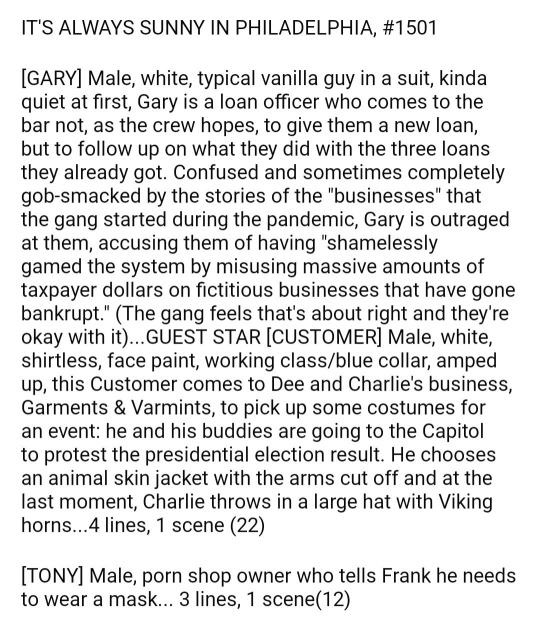
So the conceit of this episode as a whole is that during the pandemic, the gang "gamed the system" and received three (3!) Loans to start businesses that went bankrupt. One of these businesses is implied to be the one started by dee and charlie who end up selling to Qanon shaman. Already this is so impossible baby.
1. We've already seen the gang try to get a loan and it didn't work. They don't have good ideas. Ur telling me, they managed to finagle 3 separate loans for 3 separate business ideas from an actual bank?
2. Maybe I just have bad reading comprehension but how does one have a business that is both fictitious and bankrupt?
3. If the customer is supposed to be Qanon shaman, an actual real life guy, why are the only descriptors white and male? They say he's shirtless so are they going to paint on all of the tattoos he has? And if so, doesn't that kind of ruin the dramatic reveal when charlie "throws in" the viking helmet? Why would he do that anyways? Sus.
Moving on
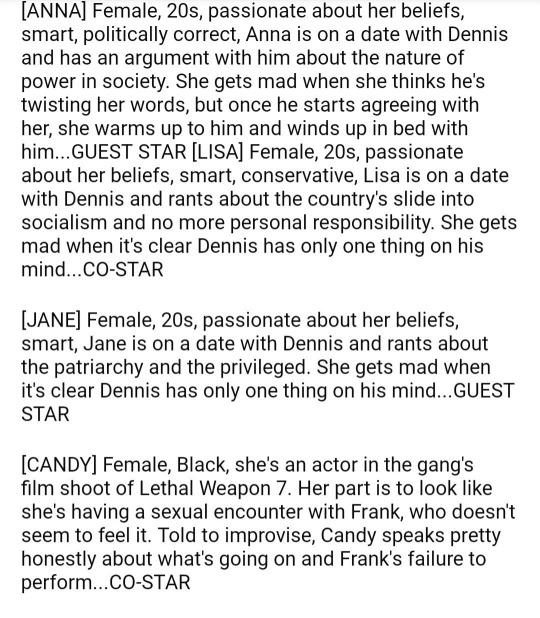
Alright this episode would fucking blow for obvious reasons but im going to refrain from looking at this through my gay dennis thruther lens because im biased.
Purely from a narrative standpoint, a woman hasn't been shown to be interested in dennis in nearly 5 years during the wade boggs episode. Ever since, every single woman he approaches has been actively creeped out by him. And now I'm supposed to believe that 3 "smart, passionate woman" (In Their Twenties!!!!!!) agreed to go on a date with him? And Anna even slept with him! Just because he what? Agreed with her? I'm not buyin it.
Plus the concept of this scenario lacks any potential for comedy. When iasip gets political, they always discuss a very specific topic using hyperbolic situations and flawed metaphors. If this is supposed to be a political episode, what ultimately lukewarm point would rob be trying to make here? So far we know they're ranting about
The patriarchy
Privilege
Socialism
No more personal responsibility(?)
The... nature of power in society(??)
How on earth would an episode like get approved? This shit sounds like a Ted talk. It sounds like it was written specifically to sound like a political episode so boring and pointless it would generate outrage and mile long essay posts from Tumblr users and reddit users alike. Almost like this one lol.
On a completely unrelated note, do not try and convince me that Frank "casual cock ring wearer" Reynolds is unable to perform.
Jeez this is getting out of hand fast. Let's move on
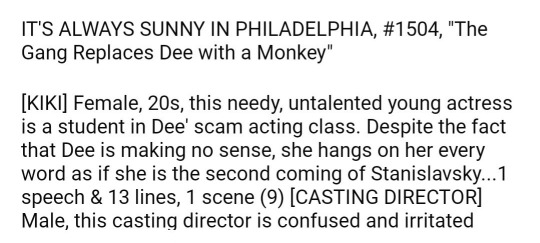
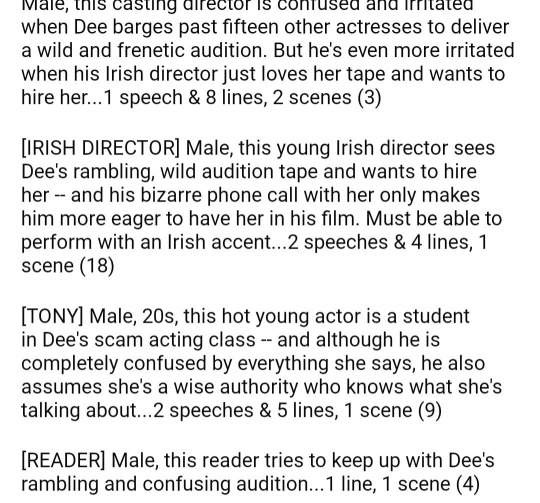
Ok now we're starting to getting into the Ireland of it all. Let me go on a bit of a tangent here about all this.. Now I thinq there are just 3 possibilities. Either this is all a publicity stunt and there is some truth to the Ireland rumors, the entire thing could be bogus from some weirdo fan (ps, if a fan did write this I want you to know I fucking hate you. You did this to me), or it is a publicity stunt but Ireland is just more bullshit.
I am going to assume it was a publicity stunt, otherwise I just wasted my entire evening and I can't have that kind of mentality rn. Additionally, I'm Going to tinhat here for a second and say that the Ireland rumors are true, but the details are different.
I say this because if they were going to do filming in Ireland, they probably figured that that information would be impossible to hide. In essence, my completely unfounded hypothesis is that this leak was their fucked up little way of controlling the situation while simultaneously messing with us.
Ok tangent is over, returning to the casting calls. From the looks of it, dee starts a "scam" acting class and has some very devoted students (Note that Tony was also the name of the porn shop owner. Seems weird!) Presumably after the gang replaces her with a monkey as the title suggests.
Honestly, there isn't too much here that's a red flag to me... seems like a nice little dee-centric episode that is the link to the Dublin angle. Assuming I am At All right, this could be a genuine plotline for Dee. However, the monkey could be a red herring and there could be a whole different side plot with the guys. who's to say. Next one!
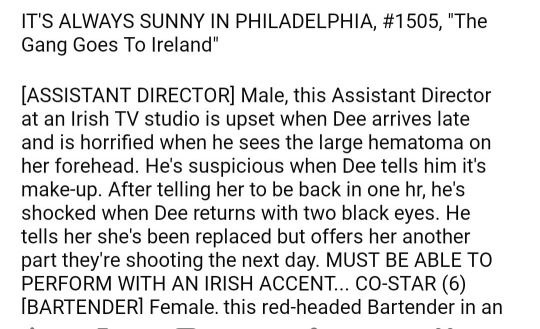
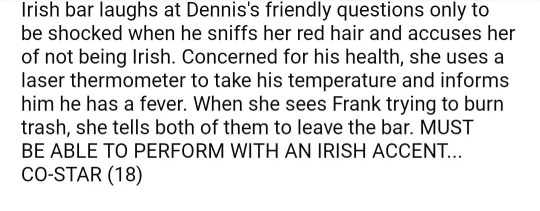
Ah yes this is the dennis we all know and despise.. no red flags for me here really, I'm also running out of steam because idk if it shows, but I am majorly sleep deprived atm. Anyway I'm going to the next one
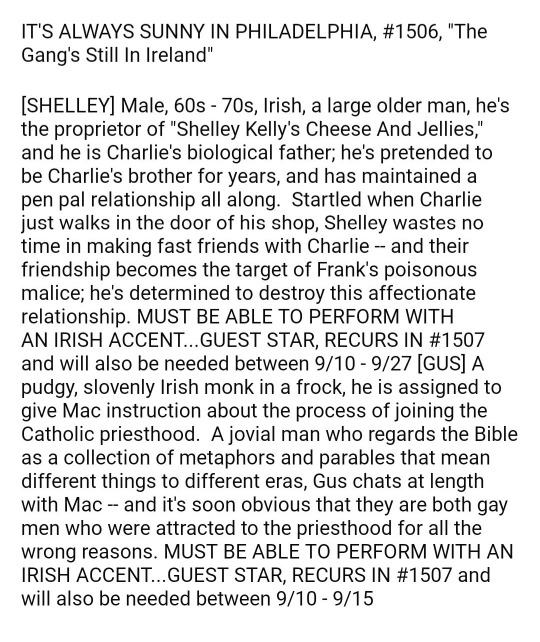
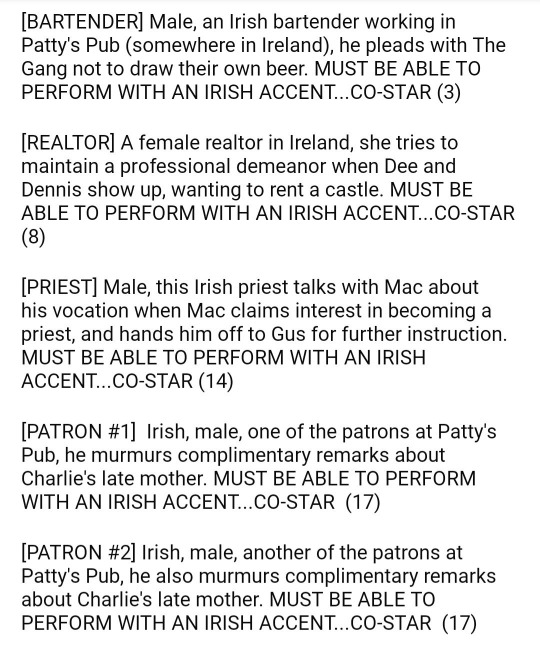
Okay this is where things start getting weird again ough a migraine just hit, anyway back to my earlier point about how casting calls would never contains major spoilers bc the people who see these wont be under any kind of NDA..
These ones reveal that bonnie dies. Again, that info wouldn't be in a casting call.
But also they suggest charlie has a irish penpal named Shelley who is his biological father. First off charlie is illiterate, although as pointed out by @undeadbreeze shelley could also be communicating in symbols. However, this scenario is still unbelievable to me for a couple reasons:
1. Bonnie's last name is Kelly obviously, and we know it's her maiden name because Jack's last name is also Kelly. But Shelley's last name is... also Kelly? In the context of this big ol hoax, it feels like it was written to show that look! his last name is the same as charlie's! That's how you know that's his dad! But It would be way too big of a coincidence if charlie's dad happened to have the same last name bonnie.
And 2. There's the whole mystery of charlie's long-lost sister from 'charlie got molested' but never any mention of a brother which according to this, shelley has been pretending to be his brother for years. And we all know how much rcg loves their continuity, it seems uncharacteristically lazy to just tack this on without any prior buildup.
And finally let me talk about mac for a second and specifically the line in gus's summary "both are gay men who are attracted to the priesthood for all the wrong reasons"
Iasip has commented on pedophilia in the priesthood many times in the past which leads me to believe that they are implying that mac is a pedophile? Please let me know if I completely misread the implications of that statement, but if not, then that is completely insane and one of the biggest indictators that this is fake. Mac is awful, just like everyone in the gang but he is definitely not a pedophile.
However even if i did completely misread that, it's still proof this is fake.. For all his faults, Rob put a surprising amount of care and effort into mac's coming-out. It hasn't been perfect, but Mfhp in particular firmly established that mac's faith is integral to his identity so Its unlikely that rob would throw all of that away for a cheap shot at priests.
Ok my brain is irradiated sludge at this point, but in conclusion. I hope that 1. I'm right, at least about it being fake (Otherwise damb that'll be so humiliating for me) And 2. This eases ur fears a bit. I don't want to lose all faith in future seasons bc I love iasip and miss the gang. If you read this far youre insane but I literally love you so goddamn much because I spent so so long tapping this out on my silly little phone
Please feel free to add on or message me your thoughts and opinions I need to know I'm not the only one who uhhh went a bit insane. And finally: whoever made these is a cunt. Mwah.
#iasip#s15 spoilers#oy vey.....#they could also be written by a reddit fan who is too much of a pussy to just write fanfic but that seems kinda unlikely?#cause 1. itll be disproven so everyone will know u just... wrote weird fanfic#and 2. there are a lot of little details that are so random that even if this is a fan just messing with people.... why put in so much effo#wahtever im pressing post#actually tho what gge fuck is that priest line supposed to imply#i guess for mac it could be talking about his view that god smites enemies and u must fear him blah blah#i jus don't know what it was supposed to imply about gus!!!#bc they describe gus like he is fat mac with healthy views on the bible which :]#then that last line just gives me whiplash what does that mean!!
70 notes
·
View notes
Note
it’s a bummer to see you can’t enjoy the ending. I hope someday you can come around it it. It wasn’t perfect but it didn’t nuke its integrity. i think the heart of the show really shines through and it’s a shame that it’s not being appreciated bc there’s so much shipping drama 😣
Hi there!
I... first of, I really need people to understand this... the travesty of the finale for me has almost nothing to do with “shipping drama.”
Yes, I see the wild conspiracy theories flying around, and I’m honestly concerned for some of those folks and hope they can find a way to make peace with this in whatever way they can, because we aren’t likely to ever get a better answer than that this is legitimately the ending that Dabb thought was best, despite years of us seeing the best of his writing choices and guiding Sam, Dean, and Cas to grow past the roles that Chuck would’ve forced them to fulfill, and that at the end it fell flat because he couldn’t actually come up with a better ending than “this was always their destiny, free will is a lie, and these characters had nothing outside of the revenge quest they’d been raised for since birth and manipulated into over and over for the entertainment of a vengeful god.”
I can see how “surface level” viewers would feel that this one basic narrative point was satisfying, that Sam and Dean had grown beyond their own hopeless cycle of self-sacrifice that had driven the narrative for so many years. The fact that they both acknowledged that they should allow their stories to end in that way was satisfying... but only in the shallowest and most detached read of the narrative. Like, is this really the ONLY thing these two characters learned in the last 15 years? If so, that is BEYOND depressing af.
And even THAT message lost all narrative weight when the two of them were once again reunited in death, as if nothing else had ever mattered in their lives. As if neither of them had ever outgrown the codependency that had driven so many of those previous self-sacrifices and refusals to let go of each other even in death.
So yeah, in the absolute most basic sense, I suppose I can see how casual viewers or people who aren’t actually invested in these characters could find that at least narratively coming back to a starting point.
But narratives don’t actually work that way, and that’s not the point of watching fifteen years of story develop in between.
This story wasn’t JUST about Sam and Dean needing to accept that death might be okay actually.
This story was also about free will, fighting for humanity as a whole but also their OWN humanity and self-identities. In Dean’s case, the absolutely transformative growth from feeling like nothing but a hammer, a killer, a tool to be used. And then less than an episode and a half later, after finally accepting that truth into his heart and using it to defeat the original creator and reclaim the story of his own life for himself... he gets pied in the face after flippantly talking about his destiny and having no choice, and then three scenes later he literally dies impaled on a great big nail... like a hammer...
So I would kindly ask folks who feel satisfied by that shallowest possible takeaway of this episode, and maybe invite folks to look just under that surface. Try to understand why loads of us will NEVER feel satisfied with this ending, and why it truly does feel like the most hopeless version of the story. Like even in defeating Chuck, they could never be allowed to own their own stories and what happened to them after that point was just a twisted version of the “destiny” that drove Chuck’s entire plotline for them anyway.
Please understand where we’re seeing this as horrifically painful irony rather than some beautiful circular narrative about letting go.
For a lot of us, the shipping stuff would’ve been the cherry on top of the sundae. We would’ve been happy with a scoop of plain vanilla, though. We would’ve been happy for anything that honored the journey to freedom, and the choice at any sort of a different life of their own making than literally falling back on a nail fighting off one of John’s unresolved hunts and a vampire who had literally never been named in canon before, yet who Dean instantly recognized somehow...
but sure, for those of us who felt that “the heart of the show” was all the stuff that the finale actually erased-- that “family don’t end in blood,” and that this was actually not a show about just two brothers but the love of their found family and coming to terms with the choices they actually HAD made for themselves versus the narrative that Chuck kept centering them in DESPITE what they would choose for themselves, the finale basically told us no, everything you ever found of value in this story actually meant nothing. It told us that Chuck’s story for them was their only truth in the end, and their only freedom was to be found in death.
Please, I am begging people, stop trying to gaslight us that this was some beautiful ending. Maybe think for a second that “your read” of the narrative that allows you to find peace with the ending is not what we saw and loved about this story for the 326 episodes leading up to this finale.
And please try to understand that we were not wrong to see the entire narrative through this lens. Because we were literally validated IN CANON, and told that we understood the depth of the story and the characters just fine, actually. There’s literally ONE episode of the entire series that burns it all down in a bewildering pile of wtf. And that’s #327. That throws that entire read out the window to well actually us all back into Chuck’s literal ending... This was literally the ending Chuck wanted to force them to enact for him, and it’s what ended up happening even after they defeated him-- the ultimate Big Bad of the entire series should’ve been defeated, but instead he pulled off one final victory over the entire story.
Becky: No. You can't--
Chuck: I did.
Becky: Y- This is just an ending.
Chuck: Yeah. I don't know how I'm gonna get there, but I know where I'm goin'.
Becky: B-But it's so... dark.
Chuck: But great, right? I can see it now -- "Supernatural: The End". And the cover is just a gravestone that says "Winchester". The fans are gonna love it. Well?
Becky: It's awful! Horrible. It's hopeless. You can't do this to the fans. What you did to Dean? What you did to Sam?
Chuck: There, see? It's making you feel something. That's good, right?
and
Dean: Well, what now? You're not gonna dust us.
Chuck: Oh, yeah? Why not?
Dean: Because you're holding out. For your big finish. Yeah, we know about your galaxy-brained idea, how you think this story is gonna go. Sam got a little look into your draft folder.
Chuck: Sam's visions -- they weren't drafts. They were memories. My memories. Other Sams and other Deans in other worlds. But guess what. Just like you, they didn't think they'd do it, either. But they did. And you will, too.
Dean: No. Not this Sam. And not this Dean. So you go back to Earth 2 and play with your other toys. Because we will never give you the ending that you want.
Chuck: We'll see.
And even in DEFEAT Chuck thought he understood these characters, thought that having rendered him powerless they would finally take their revenge and kill him, but they didn’t, because he never actually understood these characters at all. And the story he tried to force them into from day one was never about THEM, it was about HIM.
And then Dean gets like two whole days of freedom and choice and is apparently incapable of making any of the choices that don’t throw him immediately back into Chuck’s favorite story. Like none of that resolution in the previous episode meant anything at all. He even SAYS it in the finale:
Dean: Yeah, no. I think about 'em, too. You know what? That pain's not gonna go away. Right? But if we don't keep living, then all that sacrifice is gonna be for nothing.
And then two scenes later the show gives us the Nelson Muntz HA HA and Dean is no longer living, and Sam is left to carry on as a shell of himself and wander off into Blurry Wife Land to devote any even remotely content moment of the rest of his years to raising a Replacement Dean to fill the void, and is never able to pick up the pen to write anything better of his own life than Chuck would’ve dealt him in the first place.
So I’m glad that top-layer takeaway is sustaining and enough for you. It wasn’t, and will never be enough for the rest of us.
What was actually real in all of this? We were.
Until we weren’t.
And that’s honestly a shit message to be pushing on people in the wake of it all. So please stop.
I should actually thank you for the kind intent with which your message is phrased, but that doesn’t make it feel less hilariously awful. Though I chose this one to reply to as the least insulting of all the messages currently in my inbox on this subject. So thanks for that, at least.
#spn 15.20#aka that one episode of supernatural that doesn't really exist#because you either get to have the first 326 or the finale#they're literally narratively incompatible in all but the shallowest possible takeaway here#i chose the other 326 because those are where the actual heart of the show lies#it was set on fire and buried in 327#Anonymous
451 notes
·
View notes
Text
Daniel LaRusso: A Queer Feminine Fairytale Analysis Part Three of Three
(another massive, massive thank you to @mimsyaf )
part 1
part 2
8. Queerness and femininity and masculinity and the colour red and *record breaks*
If we spin the record aaalll the way back to this paragraph: “…looking at what it is girls and women in fairytales have/don’t have, what they want, and how they’re going to get it. It’s about power (lack of), sexuality (repressed, then liberated), and men.” Reading Daniel as a repressed, bisexual boy in a society that doesn’t accept his desires it’s interesting looking at how he moves through the world of the Miyagi-verse, at how threatened other men are by him, at how obsessed they are with him.
He’s out in the symbolic woods and these large boys and men see him and decide for whatever plot reasons to come for him. And they are large and violent and attractive and apart from Johnny again, they don’t have the nebulous excuse of fighting over a girl and even that excuse dies by around the midpoint when Johnny kisses Ali just to get a rise out of Daniel. He’s not trying to “win her back,” he’s not even really looking at her. He’s just trying to get a reaction. They don’t have any of the fighters in Rocky’s excuse either of Daniel being a macho opponent.
You can read whatever subtext into TKK1 and TKK2 (which becomes especially tempting once CK confirmed that the guys he fought at seventeen have been thinking about him ever since – for thirty-five years), but TKK3 is where it’s really At in terms of obsession and lust and forbidden desires.
Silver is presented as both a handsome prince who saves Daniel and mentors him (where Miyagi is undoubtedly cast in a fatherhood role) and later on becomes twisted into a dark secret that Daniel has to keep, while he turns that thing that Daniel loves (karate, it’s… it’s karate… it’s also men, but it’s definitely karate, because karate makes him feel… things...) into an abusive, violent version of itself.
A wolf in sheep’s clothing.
But he’s also offering him something liberating. Whatever is going on in that nightclub scene is about something other than breaking Daniel down. Even the bloodied knuckles aren’t just about revenge. It’s about giving him something that he isn’t, in the end, willing to receive, at least not from Silver. In that roundabout, strange way of these feminine fairytales, it’s exploring hidden desires through the metaphor of karate.
Daniel wears red because it’s his colour. In the movies he wears red a lot. Often in scenes with violence in them (the beach/the hilltop in TKK1 and the date/the destruction of the dojo/the final fight in TKK2), but he also has a variety of shirts (and in TKK3 pants) that pop up all the way through the narrative. He wears a red jacket when he accepts Terry’s training, when he punches a guy in the face, and when he tries to get out of the training again (as badly as that goes).
Did anyone consciously think about red’s link to desire, obsession, and violence when they made these? Eh. But is it there symbolically? When he meets Johnny, when he fights Chozen, when he’s in emotionally fraught situations with Terry? Hell yeah.
Probably the most lust-and-violence infused red is that aforementioned punching-board-until-knuckles-bleed bit – not that I thought Terry was going to pull him in for a kiss, because I knew, logically, of course he wouldn’t right? There’s no way… is there? Or later on when Daniel punches that guy and ends up with blood all over his shirt and Terry once more grasps him, euphorically. Blood is violence. Blood is also desire. Red is Daniel’s colour, even though he doesn’t acknowledge it come Cobra Kai. (Maybe he just needs someone else - cough Johnny Lawrence cough - to inspire it in him again).
Daniel LaRusso’s narrative is exploring that most feminine of fairytale tropes: To want and be wanted by monsters and having to hide those desires.

“Maybe this time that strange churning in my stomach that feels like a mix of anticipation and fear will turn out good for me.” - Daniel’s mind.
At the end of the story, Daniel saves himself, with all of the strange mixed narratives around it, and the acknowledgement that the end of The Karate Kid Part Three isn’t satisfying and its aftermath will likely be delved into in the next season of Cobra Kai.
Nevertheless, he saves himself. Not from Silver or Kreese or Barnes, and not entirely, but he makes a decision not to give in to fear (and he continues to try and live by that decision, making it over and over again for the next thirty-five years, even when the return of Cobra Kai makes that difficult for him).
He doesn’t do it by being the strongest in the land or even through a lucky shot (although that too). He does it by refusing to be like the male antagonists that surround him, by telling them they have no power over him. The narrative isn’t just his getting lost in the forest and all the monsters he finds there, it’s about how he redefines power for himself within that forest.
He’s a man who isn’t violent, whose victories include helping out a girl whose ex-boyfriend just broke her radio, successfully doing the moves to a cultural dance he’s trying to learn, sitting with his father figure while he cries over the death of his own father, telling a girl that she’s just made her first friend, and breathing a sigh of relief that a tree that got broken has healed.
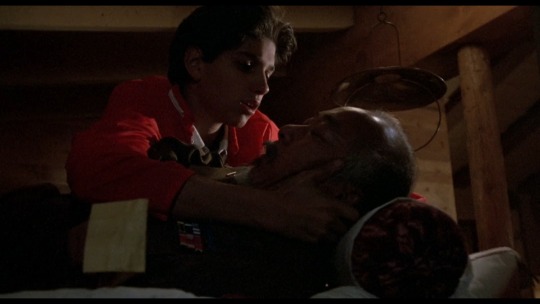
Daniel LaRusso is a good boy is the point!
Karate is a metaphor. It can turn into many things: A series of lessons learned about how to be his own man and take care of his own house, a respect for the history of the father teaching him and sharing his home and story with him, fear, desire, masculinity (and the different forms that can take).
When a tall, handsome stranger offers to teach him karate in the dark, without Daniel’s caretaker knowing how to help him, and twists that karate into something that hurts him - when he reclaims that, over and over, that means something too.
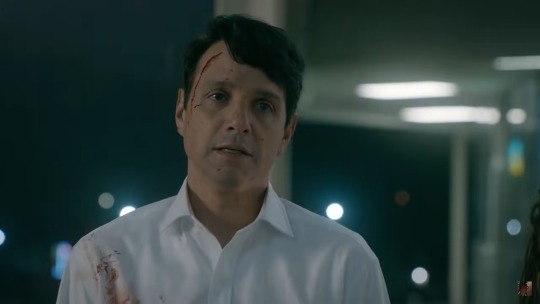
This man is fine and definitely isn’t carrying the weight of buried karate-based queer trauma - could a traumatised man do this? *stares blankly at a former tormentor as blood runs down his forehead*
9. In Conclusion Daniel Has Kissed Dudes… Symbolically… But We Can HC Literally:
So there’s Daniel and his coded feminine fairytale narrative. It’s all a series of fun coincidences.
1. Ralph Macchio is just Like That
2. Red. All the red.
3. large portion of his storyline is about lack of power. Yes, he regains that power by the end of the first and second movie through A Fight, but generally he is framed as powerless opposite these almost monstrously physically powerful boys/men. And in the third one it’s barely even about physical prowess (he’d still lose a real fight against Barnes or Silver) and more about regaining lost autonomy off the back of a manipulative, abusive relationship with an older guy.
4. The third movie in particular is narratively a mess, but if reimagined as a fairytale makes a lot of sense (because it’s secretly all about how karate is bisexuality and Daniel gets manipulated through that desire to be better at karate).
5. Queerness and femininity and themes about hidden desires that can only be approached sideways through couching those desires in symbolism: Handshake meme.
6. The fact that the more I think about it, the more feral I am for a Labyrinth AU.
7. To sum up over 5000 words of text: The inherent homoeroticism of wanting to be slammed against a locker by a bully, but extended over three movies and ever-more inventive ways of hurting pretty-boy-Daniel-LaRusso.
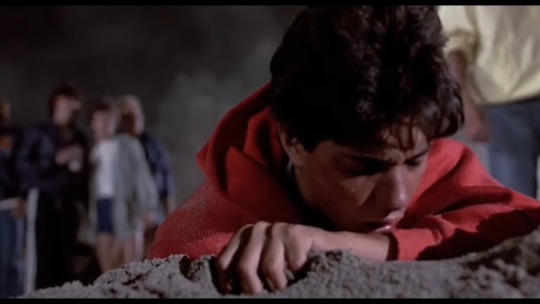
Johnny’s not going to be happy when he realises Daniel’s got other ex-rivals buried in his closet...
10. Some Other Stuff Aka The Laziest Referencing I’ll Ever Do
Further reading on trans Matrix
Further reading on masculinity and rape narrative in The Rape Of James Bond
Youtube Video from Pop Culture Detective (Sexual Assault Of Men Played For Laughs)
Some film/TV references in this: Dracula (Coppola), Princess Bride, Buffy The Vampire Slayer, Labyrinth, The Matrix, Rocky, Princess And The Frog, Cinderella, Enchanted, Shape Of Water, Swamp Thing, Phantom of the Opera
Some fairytale references: Red Riding Hood, Cinderella, The Wolf And The Seven Little Kids, Alice in Wonderland, Wizard of Oz, Sleeping Beauty, Snow White, Beauty and the Beast, Company of Wolves (Angela Carter), Through the Looking Glass, Princess Bride
Also referenced is Alison Bechdel’s graphic novel and the subsequent musical Funhome. Further thoughts on this by @thehours2002 and @jenpsaki:
https://thehours2002.tumblr.com/post/650033577171533824/daniel-larusso-and-fun-home-click-to-enlarge
https://jenpsaki.tumblr.com/post/650530225997971456/cobra-kai-fun-home-inspired-by-goldstargirls
My list of Cobra Kai meta posts
I wanted to delve into fairytale movies more, but then I was like “fuck, I have actual work to do,” but I was interested in the ways male and female characters are written in these stories:
The Last Unicorn, The Never-Ending Story, The Dark Crystal, Legend, and Stardust.
The Last Unicorn is an interesting one because she’s not really human, until she is. It’s more like The Little Mermaid (the fairytale, not the Disney film) in tone, and of course there’s a pretty substantiated rumour that Andersen wrote that one as a metaphor for falling in love with another man (who eventually got married).
Andersen in general is just fun to analyse as someone who popularized so many fairytales and exists as an ambiguously queer historical figure – might’ve been modern-day gay, bi, ace, but we’re just not sure. All your favourite fairytales can be read through the lens of queer loneliness and ostracization. Just like horror.
Anyway I didn’t go into the whole Little-Mermaid-Last-Unicorn transformation bit so much as the Monstrous-Desires bit, but I think there could be something to that too, with monsters representing otherhood and all. Stardust is a kinda-almost-this, except she sticks to her human form and all is okey-dokey by the end, she’s allowed to marry the handsome man and be a star.
The Never-Ending Story has Atreyu and Bastian and because of a lack of female characters, an interesting bond between the two of them, but mainly Atreyu is absolutely a go-gettem Hero Type and it’s just interesting to see how Bastian relates to him as both an audience insert, but also eventually as his own character in that world.
The Dark Crystal contains certain… androgynous elements of feminine and masculine coded characteristics in the main character because of how he’s not human, but also they do have a “female” version of his species that he needs to go save (and bring back to life) by the end, so in a way it’s both more and less heteronormative in its characters.
Legend sees another example of a monster (literally called Darkness and looking like a traditional devil) trying to seduce a princess through promises of power, and she “goes along with it” in order to trick him and succeeds in that trick, but is ultimately saved by the male lead.
In conclusion: I don’t even have Shrek in this.
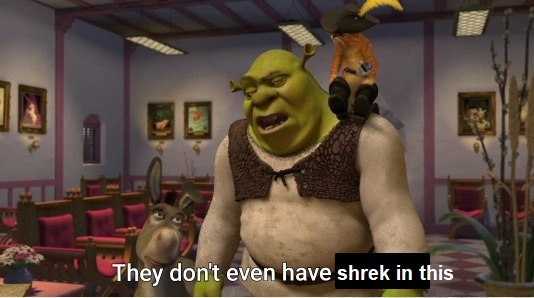
#daniel larusso#terry silver#the karate kid#the karate kid part three#cobra kai#ck#cobra kai meta#and in conclusion... brain brain brain
57 notes
·
View notes
Text

Pairing: Akaashi Keiji x Reader
Rating: T
Word Count: 1.1k of quiet loving for @doinmybesthere
Summary: Traveling through the passage of time together.

It had been a while since she had been back. Shoes clacking against freshly paved sidewalks and catching her reflection in the glass of fancy storefronts, it was like walking through the memories of her past through a distorted lens.
Squeezing Akaashi’s hand once, she points to a building on the corner of a street where a small book store where the local grandmas used to sit for hours, sipping on iced tea and playing mahjong on the low standing table, heckling the owner to abandon his post at the cash register and play a round. She paints a picture of an old fashioned arcade with fluorescent lights and loud noises, teeming with adolescents once school let out. What they see now is a sleek marble facade of some new tech company that’s taking the industry by storm and she wistfully points at the many storefronts that have exchanged hands since the last time she was there.
She hadn’t been back in this city since she had graduated college, but when Akaashi said he had a business meeting over the weekend, she booked a train ticket with him so she could show him the coffee shop she used to stop by before class, the library she used to wander in instead of studying--the places she frequented while young and bright eyed, equally confused about her future and who she was as a person.
She still isn’t a hundred percent sure and as she’s gotten older, she suspects that no one ever knows what or who they’re meant to be and she’s also not so sure if she believes in fate or destiny. But, she does know that she’s happy. And she knows that it’s in the little things that fill a soul with lightness that keeps you going. With Akaashi, it’s when she tucks their intertwined hands in his coat jacket because she likes huddling against him. It’s when she gets up early enough to make the both of them breakfast before work and she squeezes ketchup hearts all over his omelet because although cheesy, she knows he secretly loves that kind of stuff. It’s when he gave up his company-paid business class seat to her so she could have more space while she crammed in work deliverables before their stop.
The smell of exhaust and coffee, buttery pastries and the occasional screeches of tires while pigeons cluck and pick at trash, she leads him up impressive stone steps to enter the museum’s front entrance. She stops in front of the three sets of heavy wooden doors held open with velvet rope and remembers standing in the same spot years ago, marveling at the doors with her roommates, all dressed up and ready to take photos and pretend they knew anything about art.
Inside, they walk around aimlessly, taking in the soaring ceilings that make them feel small, modern light fixtures twinkling above them. Carefully reading each placard next to paintings, considering the textures of a sculpture, and wondering how a blank canvas made it to a major exhibit, she feels like time has been standing still as she takes Akaashi through the different wings of the museum.
Akaashi, on the other hand, doesn’t care much for art. He can appreciate the skill and time it must have taken to create something from nothing, the tiny details that make something complete and the feelings that come with art, but he rather have the narrative be a little more obvious. So while he skims over the descriptions of paintings and subtly Googles artists’ names to see if they’re even particularly famous, he’s more content in existing in the same space as she is. He watches as her brow creases and she chews her lower lip, trying to figure out what a sculpture represents. He likes how her pretty mouth curls and her eyes grow wide when she remembers a trivia fact about some piece or artist and eagerly tells him, pointing at the use of color in the foreground or a brief history on technique.
Maybe it’s selfish of him, but he likes that while this museum had some significance to her in the past, when she thinks of that old book store and arcade, the library and this museum, she’ll think of him too.
He hopes she’ll think of his stolen kisses when he’s certain no one’s looking and the way he loves to ask her what she thinks of a piece just to hear her whisper in his ear. He was dreading having to travel hours away just for a meeting--over a weekend too--but having her offer to tag along on a Friday and act as tour guide made the thought of his two hour meeting with his nasally manager and an overly picky client okay.
He’s actually excited, he realizes, to tell them, “Yes, I already knew that,” when they inevitably bombard him with facts about the city and things to do because, “My girlfriend told me.”
Akaashi’s not usually petty, he just happens to know his manager and client aren’t in relationships and approve romance stories too easily, but having a meeting that could have been done during the weekday, or over email , makes him a little petty. So, he says it over and over in his head, my girlfriend, my girlfriend, girlfriend, girlfriend, because he can and he’s not quite sure how an orange circle on a blank canvas constitutes modern art, but it doesn’t matter because his girlfriend is holding his hand and talking about getting pastries.
His girlfriend takes charge and leads them through the maze of exhibits to a side door, not stopping to orient herself and takes them to a warm little bakery three streets away that still exists despite four cafe chains that have been opened in a 3 block radius. His girlfriend asks him what he thinks of the city and about everything that’s changed and he can barely think of a response when warm chocolate melts over his tongue and she looks like that.
So instead he nods, eyes drinking in the sight of her clutching the ceramic mug with two hands, shoulders drooping in warmth, the tip of her nose a little flushed with remnants of the cold.
He’s doing his best at this point, really, to come up with witty quips or talk about his favorite art pieces but all he knows is that little smidge of blueberry on the side of her mouth and how maybe, this is it for him--she’s it for him because she’s abandoned her drink for his and is getting crumbs everywhere but he doesn’t care.
#haikyuu x reader#haikyuu x you#akaashi x y/n#akaashi keiji x reader#akaashi x reader#akaashi fic#akaashi imagine#akaashi keiji x you#akaashi keiji x y/n#akaashi x you#haikyuu x yn#akaashi fluff#haikyuu fluff
57 notes
·
View notes
Text
Bakudeku: A Non-Comprehensive Dissection of the Exploitation of Working Bodies, the Murder of Annoying Children, and a Rivals-to-Lovers Complex
I. Bakudeku in Canon, And Why Anti’s Need to Calm the Fuck Down
II. Power is Power: the Brain-Melting Process of Normalization and Toxic Masculinity
III. How to Kill Middle Schoolers, and Why We Should
IV. Parallels in Abuse, EnemiesRivals-to-Lovers, and the Necessity of Redemption ft. ATLA’s Zuko
V. Give it to Me Straight. It’s Homophobic.
VI. Love in Perspective, from the East v. West
VII. Stuck in the Sludge, the Past, and Season One
Disclaimer
It needs to be said that there is definitely a place for disagreement, discourse, debate, and analysis: that is a sign of an active fandom that’s heavily invested, and not inherently a bad thing at all. Considering the amount of source material we do have (from the manga, to the anime, to the movies, to the light novels, to the official art), there are going to be warring interpretations, and that’s inevitable.
I started watching and reading MHA pretty recently, and just got into the fandom. I was weary for a reason, and honestly, based on what I’ve seen, I’m still weary now. I’ve seen a lot of anti posts, and these are basically my thoughts. This entire thing is in no way comprehensive, and it’s my own opinion, so take it with a grain of salt. If I wanted to be thorough about this, I would’ve included manga panels, excerpts from the light novel, shots from the anime, links to other posts/essays/metas that have inspired this, etc. but I’m tired and not about that life right now, so, this is what it is. This is poorly organized, but maybe I’ll return to fix it.
Let’s begin.
Bakudeku in Canon, And Why Anti’s Need to Calm the Fuck Down
There are a lot of different reasons, that can be trivial as you like, to ship or not to ship two (or more) characters. It could be based purely off of character design, proximity, aversion to another ship, or hypotheticals. And I do think that it’s totally valid if someone dislikes the ship or can’t get on board with his character because to them, it does come across as abuse, and the implications make them uncomfortable or, or it just feels unhealthy. If that is your takeaway, and you are going to stick to your guns, the more power to you.
But Bakudeku’s relationship has canonically progressed to the point where it’s not the emotionally (or physically) abusive clusterfuck some people portray it to be, and it’s cheap to assume that it would be, based off of their characterizations as middle schoolers. Izuku intentionally opens the story as a naive little kid who views the lens of the Hero society through rose colored glasses and arguably wants nothing more than assimilation into that society; Bakugou is a privileged little snot who embodies the worst and most hypocritical beliefs of this system. Both of them are intentionally proven wrong. Both are brainwashed, as many little children are, by the propaganda and societal norms that they are exposed to. Both of their arcs include unlearning crucial aspects of the Hero ideology in order to become true heroes.
I will personally never simp for Bakugou because for the longest time, I couldn't help but think of him as a little kid on the playground screaming at the top of his lungs because someone else is on the swingset. He’s red in the face, there are probably veins popping out of his neck, he’s losing it. It’s easy to see why people would prefer Tododeku to Bakudeku.
Even now, seeing him differently, I still personally wouldn’t date Bakugou, especially if I had other options. Why? I probably wouldn’t want to date any of the guys who bullied me, especially because I think that schoolyard bullying, even in middle school, affected me largely in a negative way and created a lot of complexes I’m still trying to work through. I haven’t built a better relationship with them, and I’m not obligated to. Still, I associate them with the kind of soft trauma that they inflicted upon me, and while to them it was probably impersonal, to me, it was an intimate sort of attack that still affects me. That being said, that is me. Those are my personal experiences, and while they could undoubtedly influence how I interpret relationships, I do not want to project and hinder my own interpretation of Deku.
The reality is that Deku himself has an innate understanding of Bakugou that no one else does; I mention later that he seems to understand his language, implicitly, and I do stand by that. He understands what it is he’s actually trying to say, often why he’s saying it, and while others may see him as wimpy or unable to stand up for himself, that’s simply not true. Part of Deku’s characterization is that he is uncommonly observant and empathetic; I’m not denying that Bakugou caused harm or inflicted damage, but infantilizing Deku and preaching about trauma that’s not backed by canon and then assuming random people online excuse abuse is just...the leap of leaps, and an actual toxic thing to do. I’ve read fan works where Bakugou is a bully, and that’s all, and has caused an intimate degree of emotional, mental, and physical insecurity from their middle school years that prevents their relationship from changing, and that’s for the better. I’m not going to argue and say that it’s not an interesting take, or not valid, or has no basis, because it does. Its basis is the character that Bakugou was in middle school, and the person he was when he entered UA.
Not only is Bakugou — the current Bakugou, the one who has accumulated memories and experiences and development — not the same person he was at the beginning of the story, but Deku is not the same person, either. Maybe who they are fundamentally, at their core, stays the same, but at the beginning and end of any story, or even their arcs within the story, the point is that characters will undergo change, and that the reader will gain perspective.
“You wanna be a hero so bad? I’ve got a time-saving idea for you. If you think you’ll have a quirk in your next life...go take a swan dive off the roof!”
Yes. That is a horrible thing to tell someone, even if you are a child, even if you don’t understand the implications, even if you don’t mean what it is you are saying. Had someone told me that in middle school, especially given our history and the context of our interactions, I don’t know if I would ever have forgiven them.
Here’s the thing: I’m not Deku. Neither is anyone reading this. Deku is a fictional character, and everyone we know about him is extrapolated from source material, and his response to this event follows:
“Idiot! If I really jumped, you’d be charged with bullying me into suicide! Think before you speak!”
I think it’s unfair to apply our own projections as a universal rather than an interpersonal interpretation; that’s not to say that the interpretation of Bakudeku being abusive or having unbalanced power dynamics isn’t valid, or unfounded, but rather it’s not a universal interpretation, and it’s not canon. Deku is much more of a verbal thinker; in comparison, Bakugou is a visual one, at least in the format of the manga, and as such, we get various panels demonstrating his guilt, and how deep it runs. His dialogue and rapport with Deku has undeniably shifted, and it’s very clear that the way they treat each other has changed from when they were younger. Part of Bakugou’s growth is him gaining self awareness, and eventually, the strength to wield that. He knows what a fucked up little kid he was, and he carries the weight of that.
“At that moment, there were no thoughts in my head. My body just moved on its own.”
There’s a part of me that really, really disliked Bakugou going into it, partially because of what I’d seen and what I’d heard from a limited, outside perspective. I felt like Bakugou embodied the toxic masculinity (and to an extent, I still believe that) and if he won in some way, that felt like the patriarchy winning, so I couldn't help but want to muzzle and leash him before releasing him into the wild.
The reality, however, of his character in canon is that it isn’t very accurate to assume that he would be an abusive partner in the future, or that Midoryia has not forgiven him to some extent already, that the two do not care about each other or are singularly important, that they respect each other, or that the narrative has forgotten any of this.
Don’t mistake me for a Bakugou simp or apologist. I’m not, but while I definitely could also see Tododeku (and I have a soft spot for them, too, their dynamic is totally different and unique, and Todoroki is arguably treated as the tritagonist) and I’m ambivalent about Izuocha (which is written as cannoncially romantic) I do believe that canonically, Bakugou and Deku are framed as soulmates/character foils, Sasuke + Naruto, Kageyama + Hinata style. Their relationship is arguably the focus of the series. That’s not to undermine the importance or impact of Deku’s relationships with other characters, and theirs with him, but in terms of which one takes priority, and which one this all hinges on?
The manga is about a lot of things, yes, but if it were to be distilled into one relationship, buckle up, because it’s the Bakudeku show.
Power is Power: the Brain-Melting Process of Normalization and Toxic Masculinity
One of the ways in which the biopolitical prioritization of Quirks is exemplified within Hero society is through Quirk marriages. Endeavor partially rationalizes the abuse of his family through the creation of a child with the perfect quirk, a child who can be molded into the perfect Hero. People with powerful, or useful abilities, are ranked high on the hierarchy of power and privilege, and with a powerful ability, the more opportunities and avenues for success are available to them.
For the most part, Bakugou is a super spoiled, privileged little rich kid who is born talented but is enabled for his aggressive behavior and, as a child, cannot move past his many internalized complexes, treats his peers like shit, and gets away with it because the hero society he lives in either has this “boys will be boys” mentality, or it’s an example of the way that power, or Power, is systematically prioritized in this society. The hero system enables and fosters abusers, people who want power and publicity, and people who are genetically predisposed to have advantages over others. There are plenty of good people who believe in and participate in this system, who want to be good, and who do good, but that doesn’t change the way that the hero society is structured, the ethical ambiguity of the Hero Commission, and the way that Heroes are but pawns, idols with machine guns, used to sell merch to the public, to install faith in the government, or the current status quo, and reinforce capitalist propaganda. Even All Might, the epitome of everything a Hero should be, is drained over the years, and exists as a concept or idea, when in reality he is a hollow shell with an entire person inside, struggling to survive. Hero society is functionally dependent on illusion.
In Marxist terms: There is no truth, there is only power.
Although Bakugou does change, and I think that while he regrets his actions, what is long overdue is him verbally expressing his remorse, both to himself and Deku. One might argue that he’s tried to do it in ways that are compatible with his limited emotional range of expression, and Deku seems to understand this language implicitly.
I am of the opinion that the narrative is building up to a verbal acknowledgement, confrontation, and subsequent apology that only speaks what has gone unspoken.
That being said, Bakugou is a great example of the way that figures of authority (parents, teachers, adults) and institutions both in the real world and this fictional universe reward violent behavior while also leaving mental and emotional health — both his own and of the people Bakugou hurts — unchecked, and part of the way he lashes out at others is because he was never taught otherwise.
And by that, I’m referring to the ways that are to me, genuinely disturbing. For example, yelling at his friends is chill. But telling someone to kill themselves, even casually and without intent and then misinterpreting everything they do as a ploy to make you feel weak because you're projecting? And having no teachers stop and intervene, either because they are afraid of you or because they value the weight that your Quirk can benefit society over the safety of children? That, to me, is both real and disturbing.
Not only that, but his parents (at least, Mitsuki), respond to his outbursts with more outbursts, and while this is likely the culture of their home and I hesitate to call it abusive, I do think that it contributed to the way that he approaches things. Bakugou as a character is very complex, but I think that he is primarily an example of the way that the Hero System fails people.
I don’t think we can write off the things he’s done, especially using the line of reasoning that “He didn’t mean it that way”, because in real life, children who hurt others rarely mean it like that either, but that doesn’t change the effect it has on the people who are victimized, but to be absolutely fair, I don’t think that the majority of Bakudeku shippers, at least now, do use that line of reasoning. Most of them seem to have a handle on exactly how fucked up the Hero society is, and exactly why it fucks up the people embedded within that society.
The characters are positioned in this way for a reason, and the discoveries made and the development that these characters undergo are meant to reveal more about the fictional world — and, perhaps, our world — as the narrative progresses.
The world of the Hero society is dependent, to some degree, on biopolitics. I don’t think we have enough evidence to suggest that people with Quirks or Quirkless people place enough identity or placement within society to become equivalent to marginalized groups, exactly, but we can draw parallels to the way that Deku and by extent Quirkless people are viewed as weak, a deviation, or disabled in some way. Deviants, or non-productive bodies, are shunned for their inability to perform ideal labor. While it is suggested to Deku that he could become a police officer or pursue some other occupation to help people, he believes that he can do the most positive good as a Hero. In order to be a Hero, however, in the sense of a career, one needs to have Power.
Deviation from the norm will be punished or policed unless it is exploitable; in order to become integrated into society, a deviant must undergo a process of normalization and become a working, exploitable body. It is only through gaining power from All Might that Deku is allowed to assimilate from the margins and into the upper ranks of society; the manga and the anime give the reader enough perspective, context, and examples to allow us to critique and deconstruct the society that is solely reliant on power.
Through his societal privileges, interpersonal biases, internalized complexes, and his subsequent unlearning of these ideologies, Bakugou provides examples of the way that the system simultaneously fails and indoctrinates those who are targeted, neglected, enabled by, believe in, and participate within the system.
Bakudeku are two sides of the same coin. We are shown visually that the crucial turning point and fracture in their relationship is when Bakugou refuses to take Deku’s outstretched hand; the idea of Deku offering him help messes with his adolescent perspective in that Power creates a hierarchy that must be obeyed, and to be helped is to be weak is to be made a loser.
Largely, their character flaws in terms of understanding the hero society are defined and entangled within the concept of power. Bakugou has power, or privilege, but does not have the moral character to use it as a hero, and believes that Power, or winning, is the only way in which to view life. Izuku has a much better grasp on the way in which heroes wield power (their ideologies can, at first, be differentiated as winning vs. saving), and is a worthy successor because of this understanding, and of circumstance. However, in order to become a Hero, our hero must first gain the Power that he lacks, and learn to wield it.
As the characters change, they bridge the gaps of their character deficiencies, and are brought closer together through character parallelism.
Two sides of the same coin, an outstretched hand.
They are better together.
How to Kill Middle Schoolers, and Why We Should
I think it’s fitting that in the manga, a critical part of Bakugou’s arc explicitly alludes to killing the middle school version of himself in order to progress into a young adult. In the alternative covers Horikoshi released, one of them was a close up of Bakugou in his middle school uniform, being stabbed/impaled, with blood rolling out of his mouth. Clearly this references the scene in which he sacrifices himself to save Deku, on a near-instinctual level.
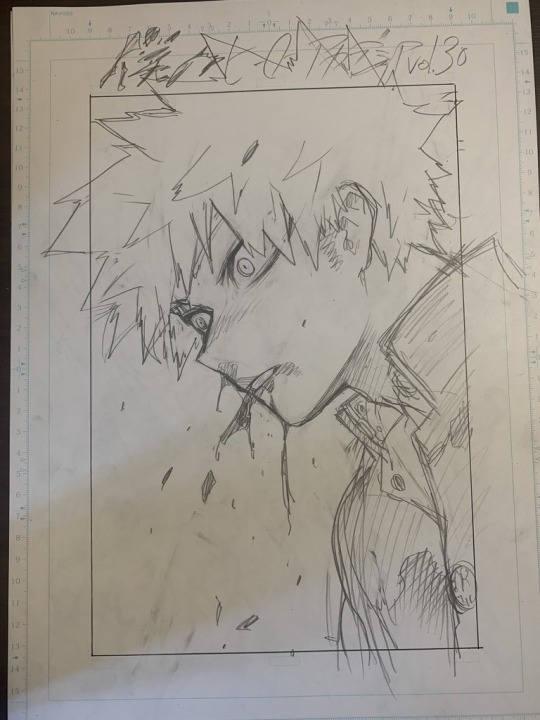
To me, this only cements Horikoshi’s intent that middle school Bakugou must be debunked, killed, discarded, or destroyed in order for Bakugou the hero to emerge, which is why people who do actually excuse his actions or believe that those actions define him into young adulthood don’t really understand the necessity for change, because they seem to imply that he doesn’t need/cannot reach further growth, and there doesn’t need to be a separation between the Bakugou who is, at heart, volatile and repressed the angry, and the Bakugou who sacrifices himself, a hero who saves people.
Plot twist: there does need to be a difference. Further plot twist: there is a difference.
In sacrificing himself for Deku, Bakugou himself doesn't die, but the injury is fatal in the sense that it could've killed him physically and yet symbolizes the selfish, childish part of him that refused to accept Deku, himself, and the inevitability of change. In killing those selfish remnants, he could actually become the kind of hero that we the reader understand to be the true kind.
That’s why I think that a lot of the people who stress his actions as a child without acknowledging the ways he has changed, grown, and tried to fix what he has broken don’t really get it, because it was always part of his character arc to change and purposely become something different and better. If the effects of his worst and his most childish self stick with you more, and linger despite that, that’s okay. But distilling his character down to the wrong elements doesn’t get you the bare essentials; what it gets you is a skewed and shallow version of a person. If you’re okay with that version, that is also fine.
But you can’t condemn others who aren’t fine with that incomplete version, and to become enraged that others do not see him as you do is childish.
Bakugou’s change and the emphasis on that change is canon.
Parallels in Abuse, EnemiesRivals-to-Lovers, and the Necessity of Redemption ft. ATLA’s Zuko
In real life, the idea that “oh, he must bully you because he likes you” is often used as a way to brush aside or to excuse the action of bullying itself, as if a ‘secret crush’ somehow negates the effects of bullying on the victim or the inability of the bully to properly process and manifest their emotions in certain ways. It doesn’t. It often enables young boys to hurt others, and provides figures of authority to overlook the real source of schoolyard bullying or peer review. The “secret crush”, in real life, is used to undermine abuse, justify toxic masculinity, and is essentially used as a non-solution solution.
A common accusation is that Bakudeku shippers jump on the pairing because they romanticize pairing a bully and a victim together, or believe that the only way for Bakugou to atone for his past would be to date Midoryia in the future. This may be true for some people, in which case, that’s their own preference, but based on my experience and what I’ve witnessed, that’s not the case for most.
The difference being is that as these are characters, we as readers or viewers are meant to analyze them. Not to justify them, or to excuse their actions, but we are given the advantage of the outsider perspective to piece their characters together in context, understand why they are how they are, and witness them change; maybe I just haven’t been exposed to enough of the fandom, but no one (I’ve witnessed) treats the idea that “maybe Bakugou has feelings he can’t process or understand and so they manifest in aggressive and unchecked ways'' as a solution to his inability to communicate or process in a healthy way, rather it is just part of the explanation of his character, something is needs to — and is — working through. The solution to his middle school self is not the revelation of a “teehee, secret crush”, but self-reflection, remorse, and actively working to better oneself, which I do believe is canonically reflected, especially as of recently.
In canon, they are written to be partners, better together than apart, and I genuinely believe that one can like the Bakudeku dynamic not by route of romanticization but by observation.
I do think we are meant to see parallels between him and Endeavor; Endeavor is a high profile abuser who embodies the flaws and hypocrisy of the hero system. Bakugou is a schoolyard bully who emulates and internalizes the flaws of this system as a child, likely due to the structure of the society and the way that children will absorb the propaganda they are exposed to; the idea that Quirks, or power, define the inherent value of the individual, their ability to contribute to society, and subsequently their fundamental human worth. The difference between them is the fact that Endeavor is the literal adult who is fully and knowingly active within a toxic, corrupt system who forces his family to undergo a terrifying amount of trauma and abuse while facing little to no consequences because he knows that his status and the values of their society will protect him from those consequences. In other words, Endeavor is the threat of what Bakugou could have, and would have, become without intervention or genuine change.
Comparisons between characters, as parallels or foils, are tricky in that they imply but cannot confirm sameness. Having parallels with someone does not make them the same, by the way, but can serve to illustrate contrasts, or warnings. Harry Potter, for example, is meant to have obvious parallels with Tom Riddle, with similar abilities, and tragic upbringings. That doesn’t mean Harry grows up to become Lord Voldemort, but rather he helps lead a cross-generational movement to overthrow the facist regime. Harry is offered love, compassion, and friends, and does not embrace the darkness within or around him. As far as moldy old snake men are concerned, they do not deserve a redemption arc because they do not wish for one, and the truest of change only occurs when you actively try to change.
To be frank, either way, Bakugou was probably going to become a good Hero, in the sense that Endeavor is a ‘good’ Hero. Hero capitalized, as in a pro Hero, in the sense that it is a career, an occupation, and a status. Because of his strong Quirk, determination, skill, and work ethic, Bakugou would have made a good Hero. Due to his lack of character, however, he was not on the path to become a hero; defender of the weak, someone who saves people to save people, who is willing to make sacrifices detrimental to themselves, who saves people out of love.
It is necessary for him to undergo both a redemption arc and a symbolic death and rebirth in order for him to follow the path of a hero, having been inspired and prompted by Deku.
I personally don’t really like Endeavor’s little redemption arc, not because I don’t believe that people can change or that they shouldn't at least try to atone for the atrocities they have committed, but because within any narrative, a good redemption arc is important if it matters; what also matters is the context of that arc, and whether or not it was needed. For example, in ATLA, Zuko’s redemption arc is widely regarded as one of the best arcs in television history, something incredible. And it is. That shit fucks. In a good way.
It was confirmed that Azula was also going to get a redemption arc, had Volume 4 gone on as planned, and it was tentatively approached in the comics, which are considered canon. She is an undeniably bad person (who is willing to kill, threaten, exploit, and colonize), but she is also a child, and as viewers, we witness and recognize the factors that contributed to her (debatable) sociopathy, and the way that the system she was raised in failed her. Her family failed her; even Uncle Iroh, the wise mentor who helps guide Zuko to see the light, is willing to give up on her immediately, saying that she’s “crazy” and needs to be “put down”. Yes, it’s comedic, and yes, it’s pragmatic, but Azula is fourteen years old. Her mother is banished, her father is a psychopath, and her older brother, from her perspective, betrayed and abandoned her. She doesn’t have the emotional support that Zuko does; she exploits and controls her friends because it’s all she’s been taught to do; she says herself, her “own mother thought [she] was a monster; she was right, of course, but it still [hurts]”. A parent who does not believe in you, or a parent that uses you and will hurt you, is a genuine indicator of trauma.
The writers understood that both Zuko and Azula deserved redemption arcs. One was arguably further gone than the other, but that doesn’t change the fact that they are both children, products of their environment, who have the time, motive, and reason to change.
In contrast, you know who wouldn’t have deserved a redemption arc? Ozai. That simply would not have been interesting, wouldn’t have served the narrative well, and honestly, is not needed, thematically or otherwise. Am I comparing Ozai to Endeavor? Basically, yes. Fuck those guys. I don’t see a point in Endeavor’s little “I want to be a good dad now” arc, and I think that we don’t need to sympathize with characters in order to understand them or be interested in them. I want Touya/Dabi to expose his abuse, for his career to crumble, and then for him to die.
If they are not challenging the system that we the viewer are meant to question, and there is no thematic relevance to their redemption, is it even needed?
On that note, am I saying that Bakugou is the equivalent to Zuko? No, lmao. Definitely not. They are different characters with different progressions and different pressures. What I am saying is that good redemption arcs shouldn’t be handed out like candy to babies; it is the quality, rather than the quantity, that makes a redemption arc good. In terms of the commentary of the narrative, who needs a redemption arc, who is deserving, and who does it make sense to give one to?
In this case, Bakugou checks those boxes. It was always in the cards for him to change, and he has. In fact, he’s still changing.
Give it to Me Straight. It’s Homophobic.
There does seem to be an urge to obsessively gender either Bakugou or Deku, in making Deku the ultra-feminine, stereotypically hyper-sexualized “woman” of the relationship, with Bakugou becoming similarly sexualized but depicted as the hyper-masculine bodice ripper. On some level, that feels vaguely homophobic if not straight up misogynistic, in that in a gay relationship there’s an urge to compel them to conform under heteronormative stereotypes in order to be interpreted as real or functional. On one hand, I will say that in a lot of cases it feels like more of an expression of a kink, or fetishization and subsequent expression of internalized misogyny, at least, rather than a genuine exploration of the complexity and power imbalances of gender dynamics, expression, and boundaries.
That being said, I don’t think that that problematic aspect of shipping is unique to Bakudeku, or even to the fandom in general. We’ve all read fan work or see fanart of most gay ships in a similiar manner, and I think it’s a broader issue to be addressed than blaming it on a singular ship and calling it a day.
One interpretation of Bakugou’s character is his repression and the way his character functions under toxic masculinity, in a society’s egregious disregard for mental and emotional health (much like in the real world), the horrifying ways in which rage is rationalized or excused due to the concept of masculinity, and the way that characteristics that are associated with femininity — intellect, empathy, anxiety, kindness, hesitation, softness — are seen as stereotypically “weak”, and in men, traditionally emasculating. In terms of the way that the fictional universe is largely about societal priority and power dynamics between individuals and the way that extends to institutions, it’s not a total stretch to guess that gender as a construct is a relevant topic to expand on or at least keep in mind for comparison.
I think that the way in which characters are gendered and the extent to which that is a result of invasive heteronormativity and fetishization is a really important conversation to have, but using it as a case-by-case evolution of a ship used to condemn people isn’t conductive, and at that point, it’s treated as less of a real concern but an issue narrowly weaponised.
Love in Perspective, from the East v. West
Another thing I think could be elaborated on and written about in great detail is the way that the Eastern part of the fandom and the Western part of the fandom have such different perspectives on Bakudeku in particular. I am not going to go in depth with this, and there are many other people who could go into specifics, but just as an overview:
The manga and the anime are created for and targeted at a certain audience; our take on it will differ based on cultural norms, decisions in translation, understanding of the genre, and our own region-specific socialization. This includes the way in which we interpret certain relationships, the way they resonate with us, and what we do and do not find to be acceptable. Of course, this is not a case-by-case basis, and I’m sure there are plenty of people who hold differing beliefs within one area, but speaking generally, there is a reason that Bakudeku is not regarded as nearly as problematic in the East.
Had this been written by a Western creator, marketed primarily to and within the West (for reference, while I am Chinese, but I have lived in the USA for most of my life, so my own perspective is undoubtedly westernized), I would’ve immediately jumped to make comparisons between the Hero System and the American police system, in that a corrupt, or bastardized system is made no less corrupt for the people who do legitimately want to do good and help people, when that system disproportionately values and targets others while relying on propaganda that society must be reliant on that system in order to create safe communities when in reality it perpetuates just as many issues as it appears to solve, not to mention the way it attracts and rewards violent and power-hungry people who are enabled to abuse their power. I think comparisons can still be made, but in terms of analysis, it should be kept in mind that the police system in other parts of the world do not have the same history, place, and context as it does in America, and the police system in Japan, for example, probably wasn’t the basis for the Hero System.
As much as I do believe in the Death of the Author in most cases, the intent of the author does matter when it comes to content like this, if merely on the basis that it provides context that we may be missing as foreign viewers.
As far as the intent of the author goes, Bakugou is on a route of redemption.
He deserves it. It is unavoidable. That, of course, may depend on where you’re reading this.
Stuck in the Sludge, the Past, and Season One
If there’s one thing, to me, that epitomizes middle school Bakugou, it’s him being trapped in a sludge monster, rescued by his Quirkless childhood friend, and unable to believe his eyes. He clings to the ideology he always has, that Quirkless means weak, that there’s no way that Deku could have grown to be strong, or had the capacity to be strong all along. Bakugou is wrong about this, and continuously proven wrong. It is only when he accepts that he is wrong, and that Deku is someone to follow, that he starts his real path to heroics.
If Bakudeku’s relationship does not appeal to someone for whatever reason, there’s nothing wrong with that. They can write all they want about why they don’t ship it, or why it bothers them, or why they think it’s problematic. If it is legitimately triggering to you, then by all means, avoid it, point it out, etc. but do not undermine the reality of abuse simply to point fingers, just because you don’t like a ship. People who intentionally use the anti tag knowing it’ll show up in the main tag, go after people who are literally minding their own business, and accuse people of supporting abuse are the ones looking for a fight, and they’re annoying as hell because they don’t bring anything to the table. No evidence, no analysis, just repeated projection.
To clarify, I’m referring to a specific kind of shipper, not someone who just doesn’t like a ship, but who is so aggressive about it for absolutely no reason. There are plenty of very lovely people in this fandom, who mind their own business, multipship, or just don’t care.
Calling shippers dumb or braindead or toxic (to clarify, this isn’t targeting any one person I’ve seen, but a collective) based on projections and generalizations that come entirely from your own impression of the ship rather than observation is...really biased to me, and comes across as uneducated and trigger happy, rather than constructive or helpful in any way.
I’m not saying someone has to ship anything, or like it, in order to be a ‘good’ participant. But inserting derogatory material into a main tag, and dropping buzzwords with the same tired backing behind it without seeming to understand the implications of those words or acknowledging the development, pacing, and intentional change to the characters within the plot is just...I don’t know, it comes across as redundant, to me at least, and very childish. Aggressive. Toxic. Problematic. Maybe the real toxic shippers were the ones who bitched and moaned along the way. They’re like little kids, stuck in the past, unable to visualize or recognize change, and I think that’s a real shame because it’s preventing them from appreciating the story or its characters as it is, in canon.
But that’s okay, really. To each their own. Interpretations will vary, preferences differ, perspectives are not uniform. There is no one truth. There are five seasons of the show, a feature film, and like, thirty volumes as of this year.
All I’m saying is that if you want to stay stuck in the first season of each character, then that’s what you’re going to get. That’s up to you.
This may be edited or revised.
#bakudeku#meta#my hero academia#boko no hero academia#bnha#mha#bakugou katsuki#izuku midoriya#ok these are just my general thoughts in response to the people who have hang ups about this ship#like y’all need to pls chill tf out ok#this is also not comprehensive and could definitely be elaborated on#but it’s just general thoughts#it’s just addressing general opposition I’ve seen#I never thought I’d ever write this much about this ship wtf
128 notes
·
View notes
Note
Book!Theon is Azor!Ahai, not Jon. It makes no sense narratively for Jon to be AA, and it’s the most stereotypical thing ever, and he’s already stereotypical, he’s the red flag for the audience. Theon’s chapters are full of hints, he has the perfect salt/smoke/stars/dragons thing at the end of ACOK, when he “dies”. His story is about destroying death, his entire narrative, with things that come from mythology and ancient literature, points to that. The show is trash, but don’t you think that it’s a little weird that Theon is there at the end and then Arya comes out of nowhere and becomes AA? And what ending does she get? Exploring the unknown SEA with SHIPS? Being free and on her own? Maybe it doesn’t make sense for her because it’s not for her. D&D already took everything else from Theon, they took this too. And even if he’s not AA, he’s still clearly connected to magic and all of that, he didn’t go though so much for nothing, he didn’t take his name back for the first time in his life, his name that literally means “godly”, for nothing. He has something big to do, and it’s about himself, not Robb and the Starks. And he’s also so clearly connected to the politics of the north and of the iron islands, a villain was literally created for him, so I don’t understand how can you say he’s not really important and all he’s got left to do is retire in a house and be sad. Of course he has a lot of trauma and that’s important, but I don’t like how people reduce him to that and act like just because those things happened, he can’t do anything else
anon with no ill will and I swear I don't want to sound pedantic or anything but I, uh, never came to the conclusion you say I came from - that said let's go in order even if I think I already went through all the reasons why it makes literally no sense if it's anyone but jon, but let's start with one thing:
It makes no sense narratively for Jon to be AA, and it’s the most stereotypical thing ever, and he’s already stereotypical, he’s the red flag for the audience.
it's stereotypical.... to us maybe, but it is not to westeros. like, you're looking at it through audience-lens because it has been years and the show confirmed r+l=j and we all figured that shit out, but to westeros, the idea that the prince that was promised is a bastard guy serving on the wall aka a state-sponsored prison where people go to not die and is filled to non-desirables to society is... the least likely option in existence? no really, but again:
first thing that should quiet all doubts, when melisandre asks r'hollor to see azor ahai bc she wants to see stannis, r'hollor shows her jon snow and instead of going like 'uh wait why am I seeing another dude' she's like 'I want to see stannis but r'hollor shows me jon snow there must be some disturbance on the line', like she doesn't even consider for a second that it might be jon;
no one else has brought WITHIN THE NARRATIVE jon up as a likely candidate - they said stannis, they said dany, they said whoever but no one ever said hey jon snow might be AA, because again no one even suspects that it might be jon;
other matter that you're overlooking here: if theon is azor ahai.... it means that the rebellion basically was for nothing? because like the entire shtick with rhaegar targaryen's bad life choices™ is that he was apparently a swell dude, then he read a book where somehow it was exactly explained how the apocalypse was gonna happen, he deduced that he was the guy who had to father AA/the prince that was promised and in order
- first he doesn't care about fighting but suddenly after that he starts getting learned;
- he immediately worries over having THREE children from which we can deduce from the narrative that as far as he knows in order to fight when the wights come he has to have three kids for three dragons and one of them is azor ahai;
- the moment his wife can't have more than two even if he's sure that he already had the right one (aegon) he still runs off with lyanna to make sure he has the third because it's that important that HE rhaegar targaryen fathers the three heads of the dragon... to the point of starting a civil war and most likely giving arthur orders to make sure that the kid lives at all costs even if he thinks lyanna's kid is NOT AA;
- let's remember that the entire schtick is also that 'he is the ptwp and his is the song of ice and fire' which means that this kid of rhaegar's is the person these books are titled after.
now, let's look again at tyrion's infamous quote which I always bring up in these cases but let's refresh our memory here
Prophecy is like a half-trained mule. It looks as though it might be useful, but the moment you trust in it, it kicks you in the head
now: given this, we can absolutely assume that no single prophecy in this book goes the way the person at the end of it interprets it... which means that rhaegar was wrong on a lot of accounts, but guess what, the thing is that one out of three of his kids is dead (if we count aegon as trueborn, if he's not then two on three but I think he's trueborn) and the one who hatched the eggs/has the dragon is DANY so he already was wrong on head of the dragon #1, and he can absolutely be wrong on aegon being tptwp which would mean mistake #2 and we should know about the prophecy, but one of his children being AA and his being the song of ice and fire looks a bit too much of a stretch to be incorrect and have AA being someone else's son also would be.... but if AA is jon ie the one he had for last that he was sure was not AA and who doesn't even have the targ name (nor the stark one) and no one suspects having that kinda ancestry then yes it fits exactly all the parameters and it still allows for rhaegar to have partially misinterpreted the entire thing even in large chunks but not enough to make it look like he was completely making shit up, which... I mean the long night is coming I don't doubt he had very good reasons to want to stop it;
also, anon not to beat the dead horse, but:
- jon's death fits all the prophecy parameters already there's the bleeding star, the smoking wound and the salt of the tears which btw is not obvious nor something you'd immediately do 2+2 about... which fits perfectly with the above
- jon died and came back to life in the godforsaken show like he's literally the only idiot who resurrected in it and we're supposed to handwave it the way dnd did?
- jon has a valyrian steel sword that he can handle while theon atm really doesn't
- we could argue that ygritte could be a possible nissa-nissa contender though I mean maybe it could also be that he and val get hot and bothered and it turns out it's her or someone else and that hasn't happened yet but surely there's more evidence for that with jon than with theon
- theon has like... povs in two books for a total amount of less than fifteen chapters, jon has at least ten chapters per book or so on, which just mathematically makes jon a main fiver character while theon is not and like I understand deconstruction and all but you don't make your ace in the hole mystical prince hero character someone who has had fifteen chapters total at most unless I remember wrong the amount he had in acok in comparison to someone who was a main throughout the entire thing
- like guys I say it as someone whose third-fave char is theon, theon is not a main fiver™ character and that's okay that's not the point, and with that I don't mean he's not important, I mean that he's not one of the five main ones that have most of the plot stuff on their shoulders and he's not THE main character, because if theon is AA then these books are named a song of theon greyjoy and considering that the main five are jon tyrion arya dany and bran I think it's highly not probable that at the end of it theon is the one character to rule them all
and that was for how jon fit the criteria, but theon doesn't fit them because again he doesn't have a number of chapters/povs that justifies such a plot twist, balon is certainly not rhaegar and I don't see how rhaegar reads a prophecy wrt balon and thinks it's about him, the heads of the dragon should be three and theon had three siblings two of which are dead and asha has no tie to the dragon storyline, this means that theon should be able to ride/command a dragon and we know that in theory just targs can and there's already three of them around - dany jon and aegon - and if anyone who's not a targ has a narrative reason to ride a dragon is tyrion not theon... and tyrion is a main fiver too, also there's the nissa-nissa/burning sword angle and as it is theon could absolutely use a bow again but a longsword with his hands maimed like that and no muscle mass would be a bit implausible, in order for the reborn prophecy to actually make sense it means his last adwd chapter should have smoke, salt and the bleeding star which it doesn't but jon's has so there's that
now, re what you said wrt theon:
Theon’s chapters are full of hints
not really? he doesn't have a tie to the magical storyline beyond his connection to bran. they have hints for a lot of things but that he's AA? idt so
he has the perfect salt/smoke/stars/dragons thing at the end of ACOK, when he “dies”
okay but then I could use the same argument for saying that AA could be davos when he survives blackwater because he says he woke up in wreckage of smoke in salty water, and then stannis has equally valid arguments bc he has the shiny sword and he's in dragonstone etc and we all know it's not stannis, also an AA death at the ending of acok when the topic has barely been introduced in dany's vision is entirely too early for me to drop that bomb
his story is about destroying death, his entire narrative, with things that come from mythology and ancient literature, points to that.
his story is about overcoming trauma and abuse and not dying in the process (which is why I think the show was trash) and okay but everyone in these books has something that comes from a mythology or ancient literature, like jaime brienne and c. all have arthuriana roots same as bran, doesn't make any of them a viable AA candidate
The show is trash, but don’t you think that it’s a little weird that Theon is there at the end and then Arya comes out of nowhere and becomes AA?And what ending does she get? Exploring the unknown SEA with SHIPS? Being free and on her own? Maybe it doesn’t make sense for her because it’s not for her.
considering that maisie williams was shocked that arya was AA and she also thought it made no sense and that dnd never thought theon had his own storyline while I can agree on the fact that it fits more for him as an ending than for arya, I don't think that means it makes him AA, same as I think that they gave sansa his storyline and possibly his confrontation with ramsay and I'm not 100% convinced on the last part anyway but that just means they didn't realize theon doesn't exist for the starks' storyline, also like.. in the show everyone but c. was in WF and theon was already dead when arya did her thing and honestly idt the battle of the long night will ever go like that anyway so idt even partially show truthing is bringing us anywhere
and even if he’s not AA, he’s still clearly connected to magic and all of that, he didn’t go though so much for nothing, he didn’t take his name back for the first time in his life, his name that literally means “godly”, for nothing
I never said it was for nothing which I'll elaborate in a second and ofc he's connected to the magic storyline... because he's connected with bran's storyline and his last round of atonement has to happen through bran in the sense that since he was the one basically forcing bran out of wf now he most likely has to facilitate bringing him back or smth (surely not dying for him), but like whatever magical stuff he has going on it has to do with bran dot, not with AA which I still think he doesn't have a stricter text connection to than davos has for that matter and idt davos is AA as I think I made clear
He has something big to do, and it’s about himself, not Robb and the Starks.
never said he didn't, and I also said that I wasn't going to speculate in detail about what theon has to do because I don't think there are enough text elements to say it now but there will be when wow comes out for sure, but like again I don't want to make predictions when I don't have the elements and wrt theon's themes/possible canon ending etc I always said that he most likely isn't going to inherit the islands but that he'll do something huge before the books are done which is gonna be tied to the northern storyline and possibly to bran because he has to go specular to acok - acok is his downfall, adwd is 'I'll find myself again', wow+ados have to be what would theon do if he decides his own thing while being his own person, or recycling my old THEON HAS HEGELIAN THEMES IN HIS STORYLINE acok = thesis, adwd = antithesis, wow+ados = synthesis so obviously he has something huge in the plans.... I just don't think it means he's AA
And he’s also so clearly connected to the politics of the north and of the iron islands, a villain was literally created for him, so I don’t understand how can you say he’s not really important and all he’s got left to do is retire in a house and be sad
aaand here we get to the point which is that... I never said that? I honestly never said that? I said he has to overcome his trauma and live and thrive and be happy after that. if he retires in a house at the end of ados after he does whatever he has to do in the main plot it's going to be because it's what he wants to do and most likely he and jeyne are going to be adorbs while doing it together or smth or if he goes back to the islands and advises asha then he's going to be happy doing that too, but like... the entire point of theon's sl is that he overcomes that horrendous abuse while not being a perfect good victim™ throughout and still be happy after and gain his redemption? that's what I always said. I never said that now he can just retire and be sad. trauma recovery is becoming happy after getting over your trauma. not being sad. and like.... sometimes not getting amazing mythological things but just being happy by yourself is actually a goal? again, grrm is a lapsed catholic. if I know that breed and I do, he doesn't think redemption and happiness are in shortage at the supermarket. and in order for theon to have narrative importance/weight/relevance he doesn't have to do magical mythological IMPORTANT™ things (even if I think he does have something cooked up as I said above), but like the entire point of his sl is the trauma recovery. he's there for that. that's literally his point in the plot and the fact that grrm created a villain for him means that he thinks it's an important thing to explore.
also I personally think that theon's arc is the best written thing in those books so like I don't want to undermine its importance, I just don't think that in order to be important™ then theon has to be dragged kicking and screaming into main fiver territory because there isn't the need.
. Of course he has a lot of trauma and that’s important, but I don’t like how people reduce him to that and act like just because those things happened, he can’t do anything else
I don't like that either esp. when coming from dnd who didn't even let him have it fully, but: and when did I ever do it? I never said that theon is only his trauma. my standing opinion wrt theon is that he's grrm's best written/constructed character (along with jaime) and his most innovative one (jaime following but theon wins it) because theon deconstructs the backstabber trope which I already went on about but:
again usually ppl who backstab the good protagonist™ get caught and punished and you never hear their pov
theon has all the povs
he's the main char in that storyline not robb
he has entirely understandable reasons that ppl decided aren't sympathetic just bc they don't want to admit that in his position they'd have done the same thing
the audience hates him for having contributed to robb's downfall but then he gets a comeuppance that's completely not what anyone would deserve for that and he gets the spotlight/the sympathy again
he gets narrative redemption saving jeyne so you can see he's not an asshole at all
has to get through horrific abuse for his entire life not just with ramsay, he's not a good victim™ but he's still written in a way that makes you want to root for him and at the end he actually comes through so you want him to keep on succeeding
which is smth that with the backstabber trope never happens
now the thing is that theon's there bc a) identity issues b) trauma recovery storylines that then get tied to bran's main one but like idg why just having the recovery storyline would make him lesser - saying he's not a main fiver doesn't mean he's not important, it means he's not a MAIN™ character... which in asoiaf doesn't matter bc even ppl without povs are important to the narration and are there to drive a point (see sandor and stannis), and I don't see why saying that the most important part of his sl/the one grrm wants to stick with the readers is the survivor part of it rather than whichever heavy magic related plot thing he has to play in the future means undermining his importance. and while I think he has that role, idt it's the most important one he has bc being a survivor is what sells his storyline/the entire arc of his character.
then if come wow I'm wrong I'll be like okay I fucked up, but: honestly, imvho there is no way that azor ahai is not jon snow, the fact that collectively as a fandom we think it's obvious doesn't mean people in westeros do, each single point of evidence is at jon and if occam's razor is a thing then it's jon and that's okay because as deconstructed chosen one as he is, jon is still the protagonist of these books and regarding the prophecy above, it makes a lot more sense that this series is titled a song of jon snow and not a song of theon greyjoy and I say this as someone who vastly prefers theon as a character. also, if smth is well-written, readers should see it coming, so the fact that jon is AA isn't predictable if it's true, it's grrm.... knowing how to write a book and plant his hints because if everyone guessed right then if he makes it suddenly someone else bc jon is too predictable then it's dnd making it arya bc SURPRISE WE NEEDED YOU TO GO LIKE WTF HAS JUST HAPPENED INSTEAD OF FOLLOWING THE NARRATION TO ITS NATURAL CONCLUSION, not 'it's too predictable' or the audience red herring the way jaime being the valonqar is an audience red herring. jon being AA should be absolutely obvious for the reader who paid attention and a total surprise for the other characters in the narration, the audience red herring is more dany than anyone else imvho and I'm dying on that hill for now, thanks for coming to my ted talk but like I don't see how it's anyone but jon personally X°D
#jon snow#theon greyjoy#janie writes meta#idk anon i've never said theon wasn't important#i said he wasn't a main char#and like.... my fave char is robb#who doesn't even have a pov#is EXTREMELY important to the narration bc the rw is the crux of 50% of the plot#and i wouldn't call robb a main either#and in asoiaf there are five mains™#and everyone else is on a level of importance#but like those five mains are MAINS more than the others#and jon is the main-est of them so X°DDD#like the fact that the protagonist of a series is the one that has to save the world isn't smth that i think grrm wants to deconstruct#he wants to deconstruct HOW he gets there#but that's mvho#peace
19 notes
·
View notes
Text

...and the unironic joys of better living through chemistry
How do I love Venom: The Hunger, let me count the ways…
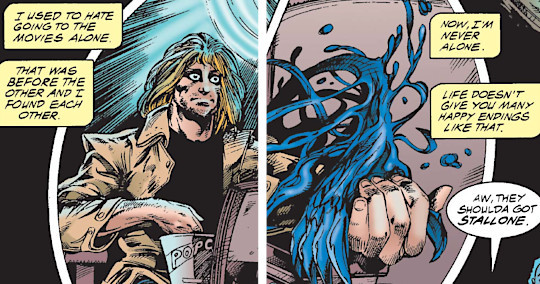
It’s by far the shippiest Venom/Eddie story to come out of the character’s heyday. It’s the only story of the era to treat Venom’s violent wild-animal instincts not as an immutable fact, but as something that can be managed. It pulls off an aesthetic like nothing else that was being done at the time.
And then there’s the way it says, Does the world around you seem sinister and foreboding? Do you lie awake at night contemplating metaphorical oceans of despair? Well shit, son – have you considered you may be suffering from a mundane neurochemical imbalance, and a round of the right meds could clear that right up for you?
It does all this without breaking the atmosphere, without a whiff that our story has been interrupted for a Very Special Message about mental health.
In the near-decade since I was first prescribed anti-depressants, I don’t think I’ve read another story that lands the message “Sometimes, it’s not you, it’s just your brain chemistry,” so well.
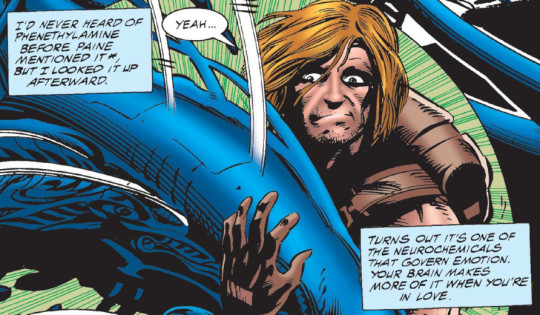
Fair warning: if you have not read The Hunger, I am about to spoil every major plot point. If you have, well, maybe I can still give you a new appreciation for a few details you might have missed.
It’s a strange book, whatever else you take from it. It’s almost the only thing either author or artist contributed to the Venom canon, and it’s so different stylistically and tonally from the 90′s Venom norm that it feels like a tale from some noir-elseworlds setting instead of 616 canon. When you take risks that big with a property, you leave yourself precious little landing space between 'unmitigated triumph’ and ‘abject failure’: if this book hadn’t absolutely nailed it, I’d be dismissing it as edgy, OOC dreck. Fortunately, if The Hunger is nothing else, it is a story that $&#@ing commits – to basically everything it does.
Now, I'm not going to tell you Venom: The Hunger is a story about overcoming depression, because I don't know whether author Len Kaminski even thought about it that way while working on it. There's always space for other readings, and this one take is not gospel. That said: holy shit is this thing unsubtle with its metaphors. And with that in mind, let’s start by talking a little about Kaminski’s take on Eddie himself.
As I may have mentioned before, I like to divide 90′s Eddie into two broad personas: the Meathead, and the Hobo.
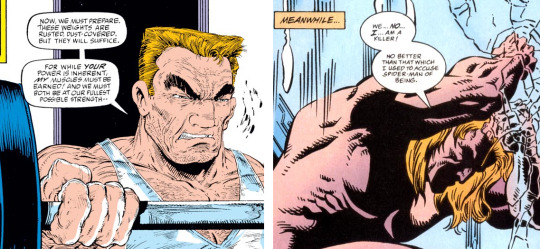
Kaminski’s Eddie nominally belongs in the angsty, long-haired Hobo incarnation, but that’s a bit of a simplification: this version certainly has plenty of angst and plenty of hair to his name – but nowhere, not even at his lowest ebb, does he doubt that he and his Other are meant for each other, which is usually Hobo!Eddie’s primary existential quandary.
He’s also taken up narrating his own life like a hardboiled PI.
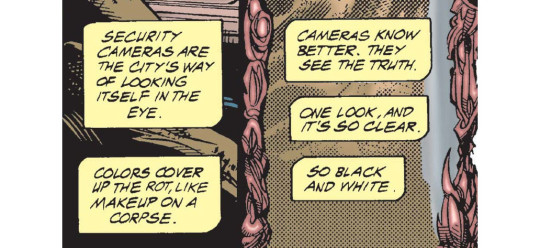
So that’s... novel.
The only other time Eddie’s sounded like this is, er, in that one other Venom one-shot Kaminski penned (Seed of Darkness, a prequel that sadly isn’t in The Hunger’s league), so I think we can safely file it under authorial ticks.
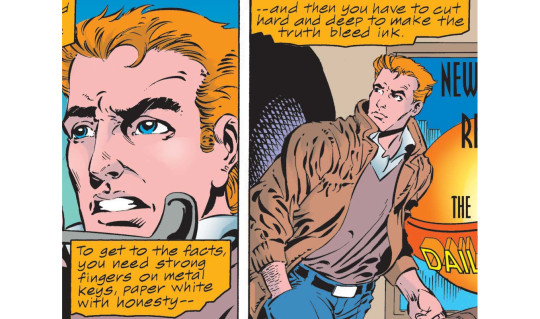
Then again, Hobo!Eddie’s always been one melodramatic SOB, so maybe this is just how he’d sound after learning to channel his angst into his poetry. You can’t argue it fits the aesthetic, anyway.
We’d also be remiss not to mention Ed Halsted’s art, which I can only describe as gothic-meets-noir-meets-H.R.-Giger. Never before or since has the alien symbiote looked this alien: twisted with Xenompoph-like ridges and veins.
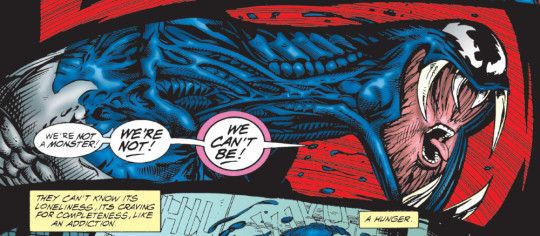
But Halsted doesn’t treat Venom to all that extra detail in every panel. Instead, the distortion tends to appear when the symbiote is separated from Eddie or out of control – and I doubt you need me to walk you through the symbolic importance of that creative decision. More importantly, Halsted’s art provides exactly the class of visuals that Kaminski’s story needs.
Did I mention this is a horror story? You might be surprised how few Venom stories really fit that genre, but if all those adjectives about Halsted’s style above didn’t clue you in, this is one of them.
Anyway, with that much context covered, let’s get into the main narrative of this thing.
As our first issue opens, Eddie’s world has become a dark and foreboding place. He’s not sleeping, though he mostly brushes this off. (Fun fact: trouble sleeping is one of those under-appreciated symptoms of depression. Additional fun fact: the first doctor ever to suggest I might be suffering from depression was actually a sleep specialist. You can guess how that appointment was going.)
Just to set our scene, here’s all of page 1.
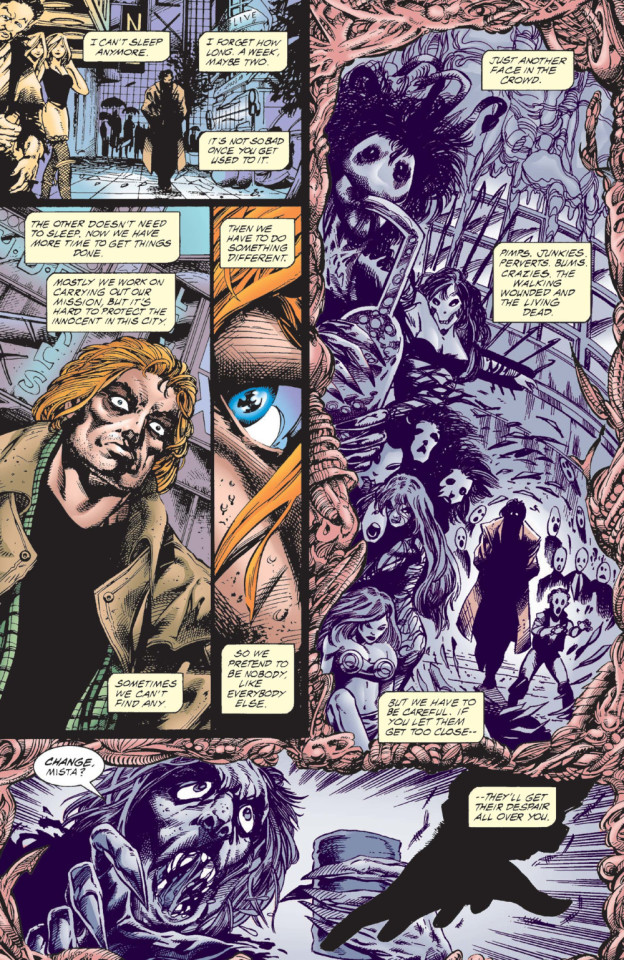
Eddie’s narration has plenty of (ha) venom for his surroundings, but the visuals are here to back him up: panels from Eddie’s POV are edged in twisted, fleshy borders and drained of colour, the people rendered as creepy, goblin-like creatures. A couple of later scenes go even further to contrast Eddie-vision with what everyone else is seeing:
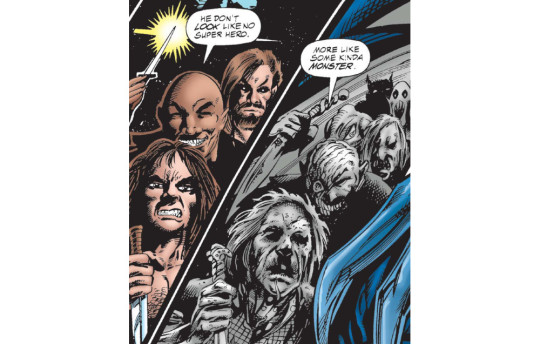
As depictions of depression go this is a little on the nose, but then, you don’t read a comic about a brain-eating alien parasite looking for subtlety, do you?
Eddie doesn’t see himself as depressed, of course. As far as he’s concerned, he’s seeing the world’s true face: it’s everyone else who’s deluding themselves. He’s still got his symbiote, so he’s happy. He’s yet to hit that all-important breaking point where something he can’t brush off goes irrevocably wrong.
But he’s also starting to experience these weird... cravings.
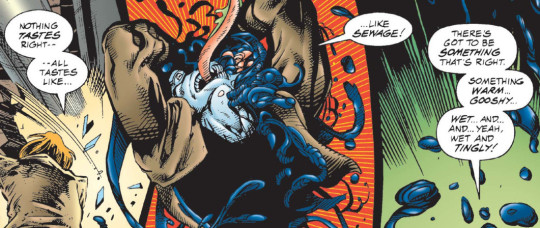
He just can’t put a name to exactly what he’s craving until a routine bar fight with a couple of thugs takes a turn for the horrific.
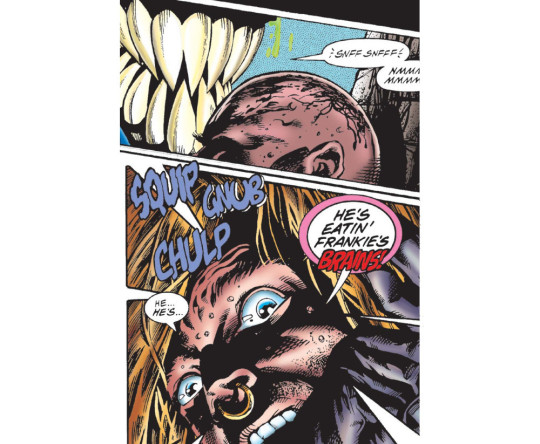
(I include this panel partly to point out even in The Hunger, the goriest of all 90′s Venom titles, you’re still not going to see brains getting eaten in any graphic detail. We don’t need to to get the horror of the moment across. The 90′s were a more innocent time.)
Eddie himself is horrified when he comes back to himself and realises what he’s done.
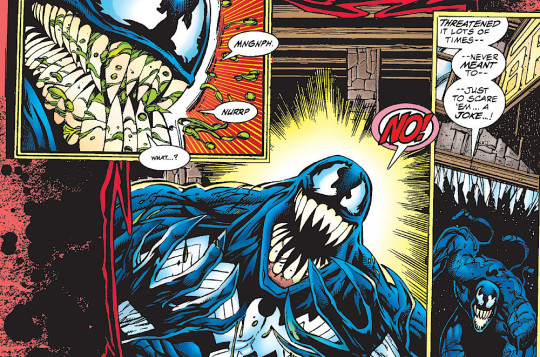
Or rather, what his symbiote’s just made him do.
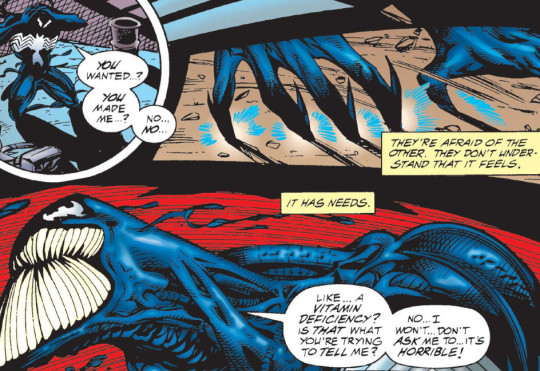
Kaminski doesn’t keep us in suspense about why, though. Eddie may have just done something horrific, but there’s a reason, and it’s as mundane as a vitamin deficiency. He’s bonded to an alien creature, after all, and his symbiote is craving a nutrient which just happens to be found in human brains. And if Eddie can’t or won’t help it meet that need, it’ll do so alone.
Now, giving us that explanation so quickly is an interesting creative decision: this is a horror story, and horror lives in what we don’t know. Wouldn’t it be all the more horrifying had the symbiote been unable to explain what’s going on, leaving Eddie without the first real clue as to where this monstrous new hunger had come from?
The Hunger doesn’t take that route though, and I love it. Eddie isn’t a monster, this isn’t his fault: he has a fucking condition, and wallowing in his own moral failings is going to get him nowhere. You might as well try to cure scurvy or rickets with positive thinking. Just like depression can make you feel like an utter failure at the most basic parts of being human, and all the affirmations in the world won’t fix it when it’s fundamentally your brain chemistry that’s the problem. Or like addicts aren’t weak-willed for struggling not to relapse, they’re dealing with genuine chemical dependency – or even like how someone who’s trans isn’t at fault for being unable to reconcile themselves to the bodies and the hormones they were born with by pure force of trying. Free will is more than an illusion, but we’re all messy, biological organisms underneath, and your own brain and biochemistry can and will fuck you over in a hundred wildly different ways for as many wildly different reasons and it’s not your fault.
We aren’t monsters. But if we do, sometimes, find ourselves identifying with the monster, there might be a reason for that.
(Ahem)
I’m just saying, that’s fucking powerful, and we need more stories that say it.
Anyway, in case you missed it during that tangent, issue #1 closes with the symbiote having torn Eddie’s heart in two itself free to go hunting brains without him.
I’m trying not to get too sidetracked at this point talking about Kaminski’s take on the symbiote itself. Suffice to say there are broadly two schools of thought on how it ought to function while separated from its host: the traditional ambulatory-slime-puddle version, and the more recently popular alternative where anything-you-can-do-with-a-host-you-can-also-do-without-one. I’m not much of a fan of the latter, personally: if your symbiote doesn’t actually need a host, I feel you’ve sort of missed the point. (The movie takes the route of saying symbiotes can’t even process Earth’s atmosphere without a host, which is a great new idea that appears nowhere in the comics, and I love it. Hosts or GTFO, baby!)
Kaminski has his own take, and I can only wish it had caught on. Without Eddie, the symbiote becomes an ever-shifting insectoid-tentacle-snake-monstrosity, driven by an animalistic hunger. It’s many things, but it’s never humanoid.
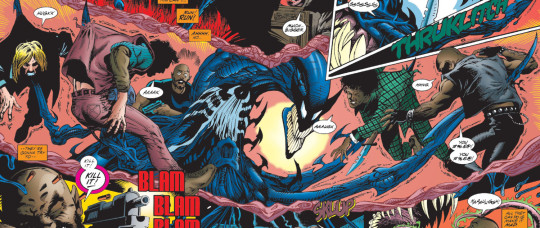
If you absolutely must have your symbiote operating minus a host, I feel this is the way to do it: semi-feral, shapeless and completely alien (uncontrollable violence and cravings for brains to be added to taste).
Issue #2 comes to us primarily through the perspective of the mild-mannered Dr. Thaddeus Paine of the Innsmouth Hills Sanitarium (yes, really).
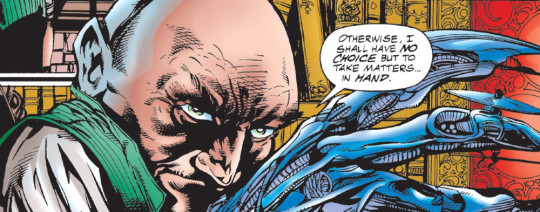
Yeah, he’s not fooling anyone. Meet our official villain! He joins our story after Eddie is picked up by the police and handed off to the nearest available institution, on account of how completely sane and rational he’s been acting.
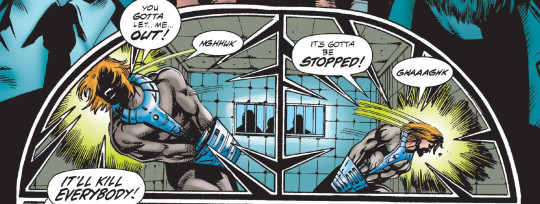
Naturally, Dr. Paine soon has copious notes on Eddie’s ‘crazy’ story about his psychic link to a brain-eating alien monster. Fortunately for Eddie, Paine also runs some tests and makes an interesting discovery.
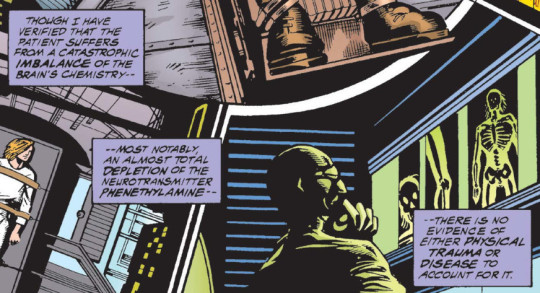
Congratulations, Venom: the ‘vitamin’ you were missing officially has a name!
Finding the right meds isn’t always this easy. I got lucky – the first ones my psych put me on worked pretty well – but I have plenty of friends who weren't so lucky. In fact, the treatment for Eddie's problems is so straightforward it arguably has more in common with, say, endocrine disorders like thyroid conditions or Addison’s disease, which differ from clinical depression but present many similar symptoms (but can sadly be just as much of a bitch to get correctly diagnosed – please do read author Maggie Stiefvater’s account of the latter when you get the chance, because forget Venom, that is a horror story).
‘True’ depression remains much less well understood by medicine, either in its causes or how to effectively treat it. But simply having a name for what was wrong with me made so much difference, and that’s an experience I imagine anyone who’s dealt with any long undiagnosed medical condition could relate to. It put my life in context in a way nothing else had in years.
(I can’t speak to the accuracy of the way phenethylamine is portrayed in this comic – a quick google suggests there may be some real debate that phenethylamine deficiencies have been overlooked as a contributor to clinical depression, but having no medical background, that one’s well beyond me. Either way, scientific accuracy really doesn’t matter in this context – it’s how it works in-universe for story purposes that we should pay attention to.)
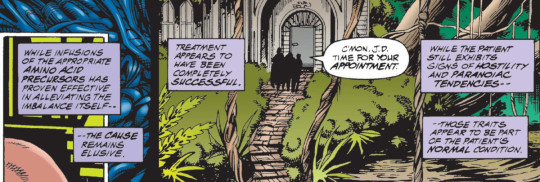
Since this issue is mostly from Paine’s POV, we don’t get Eddie’s reaction to having a healthy amount of phenethylamine sloshing around in his brain again, just the assurance that treatment appears to be ‘completely successful’.
He’s still a paranoid, hostile bastard though. Meds can turn your life around, but they won’t make you not you.
But even if Eddie’s feeling better, he’s still psychically linked to someone who isn’t. Symbiote-vision still comes through drained of colour and edged in viscera.
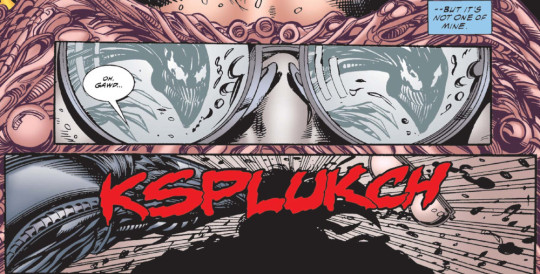
That’s the thing about meds: they won’t solve all your problems overnight. If you’ve been depressed for a while, there are good odds you have problems stacking up. But working meds can be a godsend when it comes to getting you into a space where you can deal with your problems again, whether said problems are doing-your-laundry or all the way into not-giving-up-completely-and-just-accepting-you’ll-die-alone-on-the-street.
For Eddie, ‘dealing with his problems’ begins with stealing a keycard and busting out of the asylum.
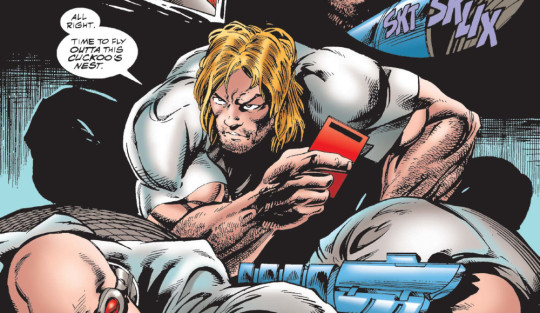
Of course, that’s the easy part. How do you solve a problem like a feral symbiote? Like any good 90′s comic book protagonist, Eddie tackles it by putting on his big-boy camouflage pants and kitting himself out with weapons and pouches while quoting “If you live something, set it free. If it doesn’t come back, hunt it down.”
We can add this to the list of things I love about this comic. Even if The Hunger is a weirdly-stylistic tract about depression at heart, it’s also still a goddamn 90′s Venom comic, and not ashamed to be.
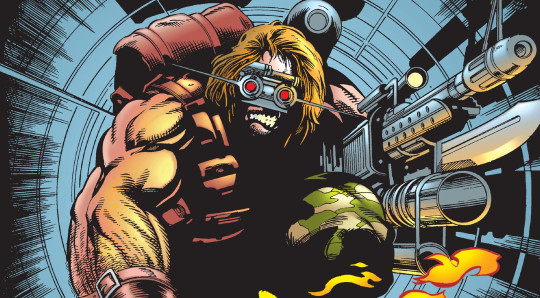
We’re into issue #3 now, and back to hearing the story from Eddie’s POV.
Eddie is very much aware that his symbiote has murdered innocent people while they’ve been separated. Even if this is the result of extreme circumstances, there’s a good case to be made that the symbiote is too dangerous to be allowed to live. Plenty of heroes would treat it like a rabid dog at this point.
But Eddie isn’t a hero, he’s a mess of a character and an anti-hero at best, so we don’t have to hold him to the same standard. He’s well aware his symbiote may be too far gone to save, that he may have to put it down – but that’s only his backup plan. He wants to help it. He wants it back. He’s down in that sewer with screamers and a flamethrower because he knows all his symbiote’s weaknesses, but he’s also carrying a large jar of black-market synthesised phenethylamine, because if he can just get close enough...
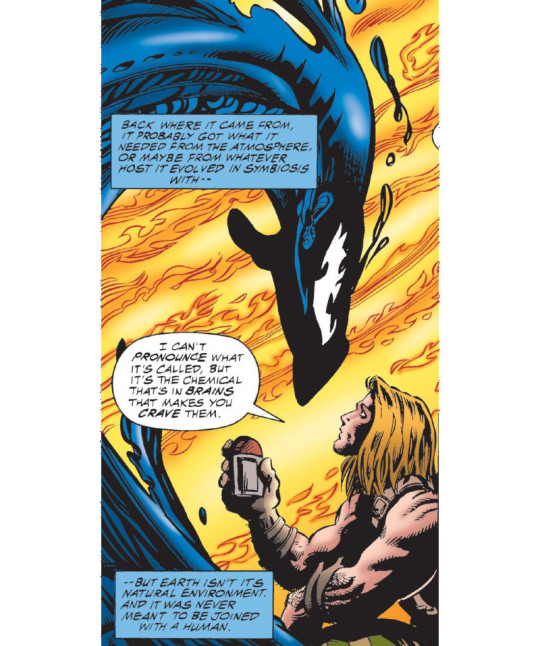
Depression can’t make you a literal monster, but it can make you an asshole. Miserable to be around, lacking even the energy to care who else you’re hurting. The depression doesn’t excuse that, but it makes everything harder, and it’s that much easier to sink back into your spiral when everyone around you has given up. It can make you think everyone around has given up even if that isn’t true.
So to have Eddie here say, in effect, I don’t care how many people you’ve eaten, I know it wasn’t your fault. I still love you. You’re still worth fighting for – god, does that get me right in the id.
There’s still a whole issue left at this point – we’ve still got to deal with our real villain, Dr. Paine, who we’ve just learned is into eating brains himself and torturing his patients recreationally, and who wants to capture the symbiote for his own purposes. There’s the scene where Eddie and his symbiote finally bond again, and Venom beats up all Paine’s goons while singing David Bowie because like I said, this is still a 90′s superhero comic and this is what Venom does.
But for our purposes, I'm going to skip to the penultimate page of the story, because the way it mirrors our opening page is really lovely.
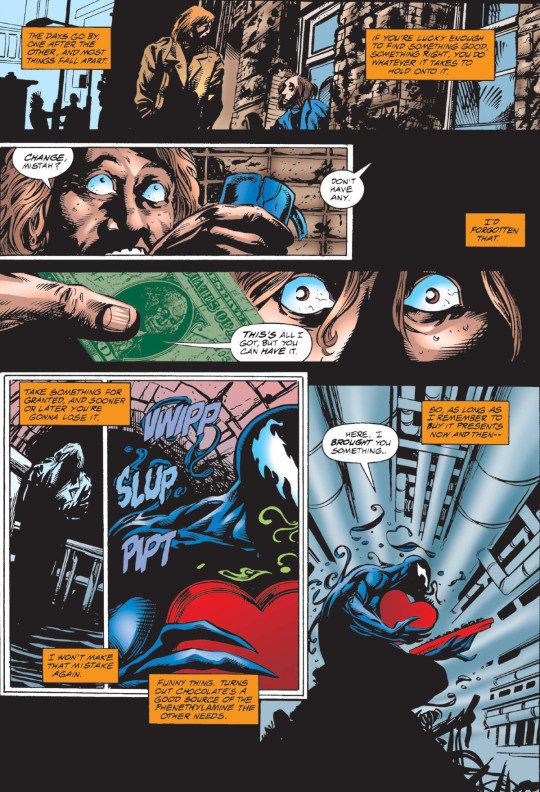
Remember that shot of Eddie dealing with a beggar back at the beginning of the story, thinking about how these people would 'get their despair all over you'? Here he is again, cheerfully forking over the last dollar in his pocket to the next man to ask him for change. For all the gothic atmosphere and gore, it’s moments like this that make The Hunger easily one of the most positive, uplifting Venom stories ever written. Funny, that. (I could probably write a whole other essay on sympathy for the homeless as a recurring motif in Venom stories, but that... well, whole other essay and all that.)
What’s Eddie learned from this experience? Don’t take your symbiote for granted. Is ‘symbiote’ a metaphor for mental health here, is paying attention to its needs an allegory for paying attention to your own? I still don’t know how literally Kaminski meant us to take this, but it’s a lovely note to end on no matter how you parse it.
At the end of the day, The Hunger isn’t flawless. The conflict with Paine ends on a thematic but slightly unsatisfying note. Eddie makes much of his symbiote's loneliness and desire for union, but when the two of them are finally reunited, the only reaction comes from Eddie's side. In fact, the symbiote seems to have no response to being able to return to Eddie at all, and that’s an omission that bugs me.
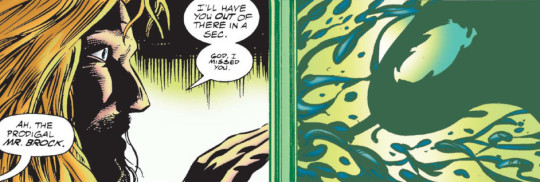
But Kaminski is more interested than any other writer of the era in the truly alien nature of the symbiote, in its relationship with Eddie from Eddie’s side, and though plenty of others talk about the symbiote's love/hate relationship with Spider-man, no-one else had the guts to portray their relationship this much like a romance.
And Venom: The Hunger is no less interesting in the context of Len Kaminski’s other work. You don't have to look far into his Marvel and DC credits to pick up that the guy has a real thing for monsters. (“All of my favourite characters are outlaws, misfits, anti-heroes,” he says, in one of the very few interviews I could find with him, “I wouldn't know what to do with Superman.”) He's written for vampires, werewolves, victims of mad science, and all of three at once, littering his work with biochemistry-themed technobabble, melodramatic monologues, gratuitous pop-culture references, and protagonists who must learn to embrace their inner demons. So The Hunger represents more than a few of his favourite running themes.
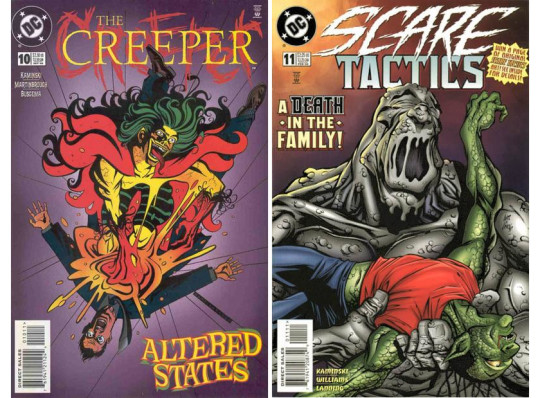
For our context, his more notable other work includes Children of the Beast, in which a werewolf must make peace between his human and animalistic sides, and The Creeper, in which a journalist must make peace with the crazy super-powered alter-ego sharing his body. In fact, The Creeper and The Hunger share so much DNA (including an evil doctor posing as a respected psychiatrist who uses hypnosis on our hero while he's trapped in a mental institution) that it’s quite the achievement that they still feel like such very distinct entities beyond that point.
The human alter-egos of both werewolf and Creeper even use prescription meds while wrestling with their respective dark sides. The difference, in both cases, is that these are stories where meds play their traditional fictional role – and that's a role that could be as easily filled by illegal drugs or alcohol without making any substantive difference. You see, if a protagonist is using them, it's a sign of unwillingness to tackle their 'real' problems. Even among work by the same author in the same genre, The Hunger represents an outlier. And that's just a little disappointing – at least to me.
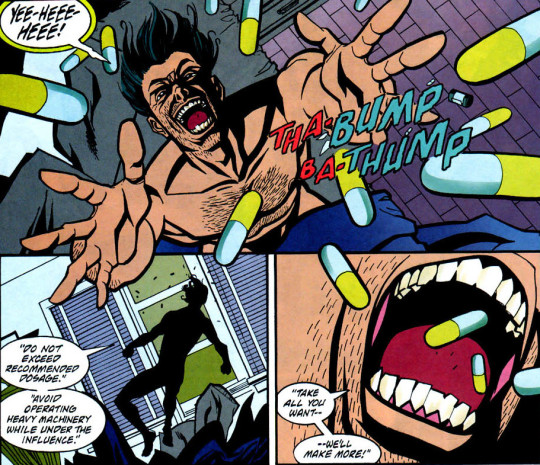
In real life, of course, prescription meds are no magical cure-all elixir. Depression meds that work for one person may not work for another, or may not keep working in the longer term. Everyone has heard stories about quack doctors who prescribe them to the wrong patients for the wrong reasons, about lives ruined by addictions to prescription painkillers, or the supposedly-damning statistics about how poorly SSRI's perform in rigorous clinical trials. The proper way to treat depression is obviously with lifestyle and therapy. People will still airily dismiss medications that we all know previous generations got along just fine without, or suggest that figures like Van Gogh would never have created great art if they hadn't been mad enough to slice off an ear. I mean, the fact you think you need those bogus mediations is probably the best possible sign of just how broken you are, right? Who do you think you’re kidding?
Our popular fiction loves stories about manly men who bury their trauma under a gruff, anti-social exterior and come back swinging at the world that broke them, bravely refusing even painkillers that might dull their manly reflexes. Other genres make space for broken people confronting their demons in grand moments of catharsis, finally breaking down into tears when someone gets through to make them face their problems. "I could barely make it out of bed in the mornings until I found a doctor who started me on this new prescription" is not only wildly counter to the accepted social narrative, it's a hard thing to know how to dramatise.
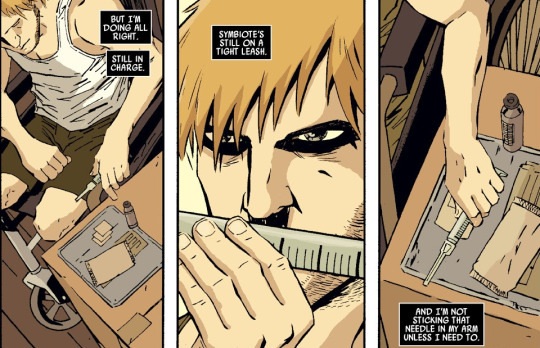
Even other Venom comics have been guilty of this.
Believe me, I recognise all of this, and just how much progress we've made in the last few decades. But I haven't the slightest doubt that for so many vulnerable people, the stigma against prescription medications does infinitely more harm than those same meds could ever do. And just having the right to externalise my problems into it's not you, it's your brain chemistry, may have helped me more than the meds themselves.
(And again, no, being prescribed SSRI's didn't fix me overnight, but I honestly don't know if all the talk therapy and tearful conversations with family members in the world could've got me as far as I've come without them.)
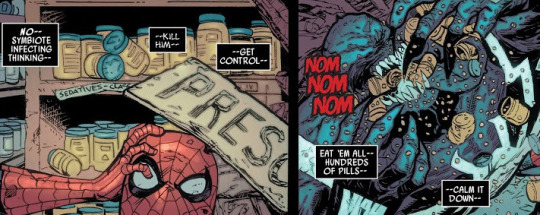
I love Venom: The Hunger. It's no-one's idea of high art, but it doesn’t need to be. There is a whole other post’s worth of things I love about it that I’ve already cut out this one as pointless tangents, and that may actually be it’s biggest drawback as a go-to example: I fully recognise that I would not be making this post if The Hunger hadn't also also grabbed me as a great bit of Venom canon, being the massive fan and shipper that I am. Other people who are just as desperate as me for more stories with the same core theme, but not into weird 90's comics about needy goo aliens, probably won't get nearly as much out of it as I have.
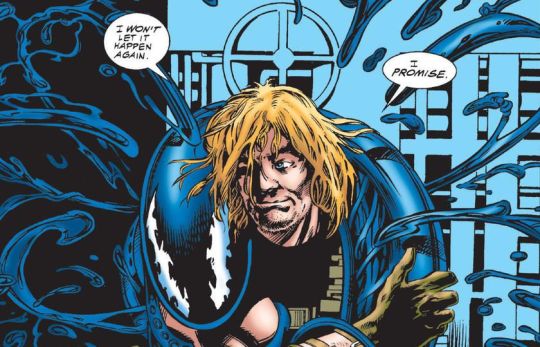
But if it sounds anything like your jam, maybe you'll enjoy it as much as I did.
If nothing else, it proves that you can make a viscerally satisfying story out of a message that shockingly unconventional. And you may even have people still discovering it and falling in love with it 25 years after the fact.
94 notes
·
View notes
Note
Hi! I sent you an ask yesterday so maybe it was me?
I just wanted to tell you that reading your opinion from that cultural bias ask almost made me cry. It was cathartic. You put into words something that has eluded me for a long time and I wanted to thank you. I don't begrudge anyone elses opinion but it has always weirdly hurt whenever I read that we might be misunderstanding Jikook's actions as romantic/intimate by viewing them through the lens of cultural bias. That seems to imply that jikook, who have collaborated with/shown love and kinship with with queer art, queer artists etc throughout their time in the public eye, might be insensitive enough to queer bait to a bizarre extent. (I understand that queer baiting is subject to debate and can come in many forms, some more toxic than others. imo none of it is great, especially in a society oppresses lgbtq people). It also seems senseless to imply that Jikook are so unaware of global queer identity that they don't realize how things come off or don't think of it as a big deal. No one can say for sure what is true. But it thats my pov.
I applaud anglo-westerners for wanting to be culturally sensitive. But sometimes what masquerades as sensitivity comes off as rather patronizing to those of us not of the west. 'O poor innocent Koreans, don't blame them for queer baiting. They just don't know better yet,' seems to be the subtextual message.
I am queer. I have spent my entire repudiating my own instincts. I have bent over backwards to seem unperverted. Could we be distorting what we are 'seeing' with Jikook? It is a possibility. But unlikely.
I used to think that there were virtue prizes for who could have the most 'realistic', least 'delulu' Jikook blog (that was still a Jikook blog). My mind changed when I read what you wrote to that anon. I realized that the kudos I had been giving myself for not being 'delulu' weren't based on unbiasedness or objectivity. They were based in self hatred and heteronormativity.
Yes Anon! It was your ask! I’m so glad you came back. Because what you have to say is so valuable. You have given us so much to think about and process. I will attempt to process your words. Please forgive my clumsiness.
First, thank you for the kind words. I’m so happy that what I wrote touched you in a positive way. And is leading towards self-acceptance and love. I am heartbroken that others make you feel “perverted” or abnormal. It is unfortunately the world in which we live. But I want to change that.
I see that this community is at different points in our Jikookie lives. And our thought processes are in different stages of development. I, too, felt that guilt and labeled some of my previous posts as “delulu time” or couched my forming beliefs in other terms, like “whatever their relationship may be.” I laughed when you wrote about the award for the “least delulu blog” because you are right. I might have been competing for that in my own way.
I don’t believe that everyone who feels that way means harm or to intimidate. They are coming from a place of wanting to protect Jikook. But, what are we trying to protect them from? We can’t protect them from the twisted thinking in the world. We can only try to change the world so that they and you, my precious Anon, can be who y’all are in it. Openly. Shamelessly. They and you should not be a candle hidden from the world in a closet.
I believe that words matter and that even my little, insignificant blog about Jikook can help to change some people’s paradigms and make the world a better place for you and them.
I do believe Jikook is in love. I want to enjoy that love. Their love makes me happy. That is why I started this blog. But it is not a place to evangelize it either. I’m not trying to sell JIkook to the world. Those who find me come because they are already aware of Jikook. I simply want to counter the narrative that saying Jikook is in love is somehow harming them. Because we make the world safer for LGBTQ everywhere by normalizing it and not trying to explain it away.
To your point about appearing patronizing... it is a valid point. It can come across as “I am more mature and refined because I know that all this can be explained with culture.” And I think you are right that we should applaud efforts to be culturally aware. But in this case, knowingly or not, people use the culture to explain away homosexual behavior. And that is what is wrong. So we can debate whether JK meant Dangshin as a term of endearment or just you. We can debate whether JM meant spouse or pet when he called him banryeo. We shouldn’t debate Rose Bowl. We shouldn’t debate GCF Tokyo.
I know they are aware of gay culture. I know that they are aware of how they can and are being perceived. And I think too much of them to believe that they are acting out a BL narrative for fans 24/7.
Lastly, I am glad you are accepting yourself more now. And I am happy to have contributed a small part to that. I hope you come to love all your beauty, strength, and goodness; and also that you come to love your weaknesses and your character flaws. Because acknowledging them, accepting them is the first step to growing past them. And becoming a better you.
Whew! How did I do? I hoped I responded to all your points.
Here is a free Jikook gif for reading to the end. 🤣 Go forth and be shamelessly yourself.
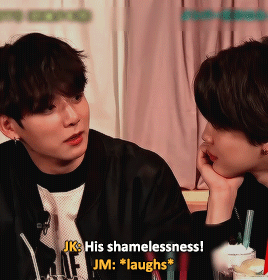
Borahae💜
Jikookerie🐥🐰
53 notes
·
View notes
Text
More Last Holiday Musings...
I want to poke at that interdimensional geoscope a little more, because upon reading it over again, I think I splashed it up a little fast and there are a couple of points I’d like to be clearer about. I meant to queue this up to post last night but also want it to be up before Gimme Shelter so ¯\_(ツ)_/¯
This is more blue curtains lit crit with a dash of folklore and an honorable mention for post-structuralism. And we’re talking about Supernatural after all, so this is sort of... well, it’s about endings.
Last Holiday was not a typical “filler” or even a typical MOTW episode. It felt extremely insular, possibly more so than any other episode I can think at any other point in the series. As opposed to the usual crowd of “locals,” a spate of victims, and a couple of red herring suspects, the only other people in this ep besides the Winchesters (including Jack) and Mrs. Butters were the two vampires and Cuthbert Sinclair. There was no “case” as in a usual MOTW-- there was no Chuck Struggle, either, and the lack of mytharc was strange against the lack of “filler” schema. That lack of “MOTW investigation” marked this episode also as being about “curiosity”-- the Winchesters all-too-quickly took Mrs. Butters for granted-- Dean even dismissed her as a “Magic Roomba” and that seemed to settle the matter. Furthermore, the moment that Dean spotted Mrs. B in his room, the stage was set for Antics ™ when she held up his goofy Scooby boxers, and indeed a zaniness, an almost manic energy drove the action forward at a breakneck pace. [Spoiler alert, we do get “investigation” in the next episode, 15x15 Gimme Shelter, as stills and the preview show that Castiel and Jack will be teaming up together, in yet another shake-up of the usual “MOTW” template, almost like we can expect the other side of a coin when Sam and Dean switch places with Cas...] These features set Last Holiday apart as not so much “filler” as “between,” as in there was struggle before, and there will be struggle after, but for a while there was cake. (Contrast this to the usual “peril of the threshold” that usually shrouds liminality if you’d like.)
At the end of Last Holiday, however, we finally get to find out what that old blue telescope really is, and with that name we get confirmation that there are no more alternate universes-- Chuck has burned them all. Viewers are left to come to the conclusion that in retrospect the telescope-thing could have changed the course of season 13 completely. The reveal is played off as darkly funny, but it’s also kind of a gut-wrenching moment, too. All the heartbreak of the last two and a half years, reviewed now through the lens of “if only.” If only they’d known about Mrs. Butters from the time they found the bunker, “none of this would have happened”… they’d have had monster radar, they’d have had the geoscope, they would have had supernatural help of a completely different level.
The temptation to read Last Holiday as a Chuck-free episode is strong, but fraught-- the threat of Chuck’s involvement has been established by a pattern this season (well the pattern is woven throughout the whole series really but Dabb has deliberately structured these last three seasons with an exponentially increasing frequency.) I feel like we’ve been conditioned this season in particular to hold ourselves in a perpetual flinch, to be afraid of what we’ll learn “in retrospect.” That geoscope was really_good_subtext, and it is entirely possible, even encouraged, at this point in the plot to take information we’ve learned from the naming of the object, examine our own conditioned response to this episode, and apply both things to the structure of the season so far and make a prediction as to what might happen in the main plot. That’s what I mean about subtext getting loud. We’ve been given the green-light to make a prediction about The Struggle and march forward with it, and see if we will be correct by extrapolating the pattern, or if that expectation will be subverted (the twist is set up to run either way, so either outcome is satisfying.) It is Melville-esque architecture of the highest degree;I could write another thousand words just about that. So I have a prediction that I’m hanging on to, because of what we’ve learned from the geoscope, and what kinds of clues were hung up in Last Holiday, and I’m super excited to either have my hunch confirmed or be frightfully and delightedly surprised. I mean, where the fuck did Jeremy Adams even come from? He’s like our own Mrs. Butters, showing up in the last quarter to run a couple game-changing balls into the end zone, it’s bonkers. I mean, I know writing mysteries is hard and requires still AND cunning, but damn, son.
But anyway, back to the geoscope…
I’m perplexed, from a very “lit crit” perspective, but this is where I’m at and why I referenced blue curtains-- if you shine too bright a light on subtext, does it evaporate-- like looking through an interdimensional geoscope and not seeing anything-- or is “subtext” sometimes not some ephemeral fever-dream that we as viewers conjure up through our experiential interlocution with the text but something a writer has steeped into the narrative as part of their craft? Or when you’re talking about an evolving iteration of writers, is it possible that one picks up a thread that another wove in for something else, repurposing or amplifying it? And, when perhaps is something deliberately instilled in the text in order to become “text” at just the right time? In Moby Dick, [spoiler alert lol] Quequeg’s coffin-- formerly one of many symbolic vehicles used to foreshadow the doom of the Pequod-- is repurposed as a life buoy and becomes the actual object that saves Ishmael’s life, transforming it from a portent of disaster to a symbol of salvation and then to one of Ishmael’s guilt for surviving Ahab’s madness-- the guilt that had been made text by the very opening line of the book, “Call me Ishmael.” In retrospect, the connotations of wandering, exile and salvation behind the name that the narrator gives himself become crystal clear. The problem that the post-structuralist model of “reading” as simultaneously “creating the text” has manufactured is that the idea that “subtext” can often be discounted as something dreamed up wholecloth by the reader, and thus inferior, imaginary, even delusional (and I use that last word knowing what a loaded term that is in the spn fandom, but this is not about a ship, even) where once it was considered to be a valid and measurable part of the text itself, like that dang coffin. It was the basement, the underpinnings, the catacombs below the opera house sure, but it helped to hold up the structure. And for some reason, putting subtext into a piece of media has become passe, or cringe? Anyway, not to be bitter on main but it didn’t used to be this way, at least not in the heady early days of postmodernism. So that green light? Critical hit against blue curtains. And while yes, some readings are going to be better supported than others, and the wild variety of checklists in this fandom mean that some conclusions have been drawn which can’t pan out, if you’re paying attention to the structure, the subtexts, the alchemical/psychoanalytical/postmodern themata, the ending will be very satisfying.
So. What was once speculated to be a symbol for emotional lows or turning points (among other things) in the bunker was textually hit with a bright green light, then Dean got curious about it in text, and we were told-- in text-- that oh it’s just a fancy spyglass, and now that the other worlds are gone, it has no purpose…. that’s what I mean about the geoscope now being “pure”-- it wasn’t clear whether the telescope ever had any function, subtetxtual or not, and now that it’s certain what it’s “function” was, it’s now freed up as a “symbol”-- unless like in Moby Dick it’s new “purpose” is revealed later, but right now it’s caught in this liminal place of not-quite-clue and not-quite-metaphor...
However, and I didn’t put this in my first post because I was trying to be fast and not a wet blanket, but I felt like finally naming the geoscope was an ending.
This is literally Singer, Dabb, and Co tidying up the house before locking it behind them.
I think when Dean said he didn’t see anything through the “telescope thing,” that we’re to understand that maybe this was the last hurrah of the cute, zany, campy “subtext” or even “metatext” if you’d rather that so many of us have been parsing and which has gotten so weird and bright since season 12/13. I think I said in one of the folklore posts that writing about some of the things I write about feels like making daisy chains in the endzone during the big game. Which is fun, that’s how I personally got through having to be in AYSO soccer for four years, by looking for four leafed clovers and eating orange quarters. And we got a wood nymph in this episode, textually even, so I could easily check the “folklore” box on this one. But the sheer euphoria of Last Holiday and all the sparkles it brought into the story aren’t meant to last. When you look back on fifteen years of text, a lot of it is bleak, miserable stuff. That’s not to say that episodes like Yellow Fever and Hunteri Heroici and Fan Fiction et al shouldn’t be celebrated. But I think from here on out, things are going to be less “golly gee, three birthdays!” and more “There she blows! --there she blows! A hump like a snowhill!”
This episode was a gift in many ways, not just for the sense of glee it transmitted-- it also did so much work and there are things I want to yell about in the way language was hit, the red versus green lighting, the way the backwards holidays worked, the projector as a metaphor for Mrs. B projecting her regrets and fears onto Jack, the amount of food that was created and consumed, how that smoothie was also an echo of “fairy food” or an underworld pact if you squint-- but the stakes are so high now. We haven’t been shown the next valley-- there was no final scene of Chuck rubbing his hands together like the villain from a melodrama, for example-- but the last image we got was Jack blowing out a candle. After the candle is blown out, the cake is dismantled and consumed. Once the story is over, all the themes that are so hard to grapple in a text like a television show can be gathered up and analyzed. (IS that all, though? After all, Dean made his own cake later, which, like, echoes of the “oh two cakes” comic lol...)
Since I really never want to leave anything I toss out on this blog on a last note of doom and gloom, however, I do want to say that I too understand what that last image meant. It meant, as Sam said, make a wish. Think of the future, think of free will, and hope for something wonderful to happen. (or do like me and wonder what the hell Jack wished for with dread and anticipation ha ha ha.)
#the poststructuralism of supernatural#the folklore of supernatural#no more tags right now#tag later
49 notes
·
View notes
Note
Do you have any recommendations for small town romance books? Or found family books? Thank you!
YES. do i ever omg. a good chunk of these will be children's books if that is alright bc that's where my love for this mode of storytelling really birthed itself. well, that and the arthur tv show bc childhood me was positively enthralled by the idea of a group of friends all living within relative walking distance of each other and being able to eat ice cream at the same shop every afternoon. there was an intimacy to it that fascinated me, as silly as it sounds
the penderwicks by jeanne birdsall - this series is a loose, modern retelling of little women that mires itself in the atmosphere of comforting, lively niches and the mountainous landscapes of the american northeast. jeanne birdsall used to do around three to four years of research between writing each book and i think it lent itself so well to what she wrote bc i was pulled effortlessly into the plot each time. the sense of camaraderie between this small collective of people as you follow them across the course of many years is so endearing and it's probably the defining small town book series for me
main street by anne m. martin - most people know anne m. martin bc of the babysitters club. i know her bc of this series! it's about two girls whose parents die in an accident, so they're taken in by their grandmother. she lives in this quiet town where the sense of community is so intimate, esp bc she lives in a row house! there's about eight houses on one street all connected to each other through secret doors in their attics and the neighbors as such are very close. i love the depth of humanity martin develops in the characters, esp bc it really touches upon how each person you know is dealing with their own struggles that you may not be entirely privy to, and then there is a series long plot around the town's history that really helps to illustrate how community prospers and evolves over time
anne of green gables by l. m. montgomery - ok this is a bit of a self evident answer but nonetheless, i feel compelled to include it. this is probably the defining small town story classic, i think? the series builds itself upon anne's imagination and how that not only fleshes out green gables (and her other hometowns) in its simple beauty but also approaches the very real personas of the people she grows up with, as compared to her more romantic and idealized aspirations for herself. it's simultaneously an exploration in romance and realism through the lens of a small but growing community around anne, and montgomery's prose really makes it a magical experience. the romance is also to die for oh my god one of the best slow burns in history, nothing will ever compare to the pure drama that is anne shirley and gilbert blythe's years long love story
beartown by fredrik backman - the tone of this book is pretty drastically different from the other recommendations here but it's nonetheless one i would put forth bc it very closely analyzes the flaws in mindset that can arise from small town living as well. there's a lot of sadness and grief, but it manages to balance this fine line of critiquing narrow mindsets and resistance to change while believing in the ability of a community to come together and mature. it's just. . . very real, and i stayed up listening to it until 4am one night and couldn't stop crying bc the raw emotion of it all really touched me. the random closeness between certain members of the town really got to me, esp in the sequel novel, us against you. just be sure to check out the trigger warnings before reading
aurora county trilogy by deborah wiles - oh my god. ohhhhh my god. you would not believe the memories i have around these books. i remember listening to love, ruby lavender in the car when i was maybe ten or so and positively falling in love with this grieving ten year old girl, and her mom who writes about recipes using zucchini, and her grandmother whom she rescues chickens with. each book in this trilogy centers itself around a child dealing with the death of a loved one, and i think that is a very unique experience to read about, bc children are already dealing with enough at that age. they have to figure out how they're going to fit in, how they're going to navigate the rest of their lives without someone they love so much, and in this small town setting, how to share this grief with a bunch of people they don't want to share that grief with. the books are deeply sad and simply honest, but in a way that's very cathartic to read about at any age
because of winn dixie by kate dicamillo - it's been years and years since i read this book or rewatched the movie but here's another rec that centers itself in a child dealing with grief, albeit not grief over death, but abandonment and isolation. opal's bond with winn-dixie leads her to meet and bond with several people of the new town she moves to with her father, and those building friendships become a way for her to process her grief and move forward from it. i have very vague memories of it now but i remember enjoying how eccentric each of the characters was
beach read by emily henry - this is a much newer rec than everything else on this list but so well deserved! this made me cry my eyes out at 4am it was so crazy. january and gus are two people who knew each other in college and coincidentally meet again as neighbors in a small town, where both have travelled to try to beat their writing slumps and chug out a new book. as a way to challenge themselves, they decide to write a book within the genre that the other person excels at, and doing research along that vein allows them to learn a lot more about each other than they initially thought they did. there's a lot of grief underpinning the story, and the people in the town aren't necessarily a huge focus, but i think the quiet of the setting really allows the emotion to permeate the whole thing and drawn you in, bc sometimes you just have more room to think and dwell and reflect when you're in a quiet corner of the country
i hope these are sufficient for now, but lmk if you'd like recs within other media too! i feel like i have a good chunk of dramas and tv shows that speak to this narrative setting
4 notes
·
View notes
Note
hi same anon as before. i feel that response is extrapolating on your already-existing incest reading. which is like, a valid reading for you to have in that context? but um to be clear i don’t really care to discuss that for many reasons but partly because the analysis of it like that isn’t interesting for me specifically. your previous responses and then that one are.. okay let me explain further.
they’re confusing to me because within the framework of the episode. it’s made clear the siren doesn’t always seek to replace a sexual/romantic relationship. the second victim is emphasized as deeply infatuated with the siren who, to him, has the appearance of a beautiful stripper. he’s also emphasized to be caring for his elderly and implied to be ailing mother, with several shots before he is influenced into killing her meant to convey that she is important to him and he loves her very much. it’s also meant to show sirens target anyone the victim is close to.
i don’t wanna get into dean is bi analysis in the anon askbox of a wincest hateblog, so i’m going to try and avoid working with what to you are suppositions here (in that normally i’d engage with this episode from a dean-is-bi lens to be clear.) the episode makes it absolutely clear that 1. sirens don’t just target romantic/sexual relationships, with some emphasis specifically on familial relations. and 2. the episode never sets the same precedent for sirens. you could maybe call this bit an extrapolation but i’m running with it rn. Nick says a bunch of lines about i’ll be ur little brother, i’ll never leave you like he did, etc etc. Personally I think this works really well with a bi reading of dean, most especially when viewed in pairing with later episodes wrt queer dean readings. i don’t wanna get into it too much on anon but i hope you get what i’m saying?
anyway, with the 2nd victim the same siren feeds him lines about not letting his mother keep them apart, that she’ll fulfill him and he doesn’t need her. which are key emotional beats nick feeds to dean, too. (also what i wrote just above, just realized i didn’t go into what my point wrt the nick lines. but i don’t wanna like, do that unprompted on anon so.. ask me to elaborate if you want i think it’ll make my reasoning make more sense to you?) okay tldr what i’m saying is the siren episode goes to pains to show that sirens don’t just influence victims into killing their spouses & seek to appeal to their victims need for companionship, but it doesn’t do the same for saying sirens don’t have to appear as sexually attractive to their victims. you can remove the killing sam bits from an incest narrative, but it’s difficult to take the nick as deans siren aspect out of a ‘sirens sexually attract their victims’ framework the episode had been building. the only thing the episode does to take it out of that context is make Nick a dude, which... okay. uh this is maybe you should consider your own reading comprehension manifesto
they’re confusing to me because within the framework of the episode. it’s made clear the siren doesn’t always seek to replace a sexual/romantic relationship
Yes. Which is why my primary reading is that the siren was trying to fulfill Dean's deepest desire: to have a devoted little brother who hero worshiped him. But, it's also in an episode literally titled Sex and Violence and the siren targeted its victims by appearing as sexually desirable. I think it makes sense for the siren to choose a different route with Dean: he's a very beautiful man who can get plenty of pussy so why go through the effort of taunting him with something he can already have when it would be so much easier to go down the Ideal Baby Brother Angle?
But, here's the thing. The episode is also dripped with incestous subtext. Intentionally. Because season four is about breaking down Sam and Dean's relationship and showcasing their bond in the most destructive and ugly way possible. Adding an element of incest is in the same ball park as Dean nearly killing Sam with his detox and Sam nearly strangling him in their fight. This is them at their lowest point, and their lowest points have Uncomfortable Implications.
i don’t wanna get into dean is bi analysis in the anon askbox of a wincest hateblog
You might as well. Be complaining about bad interpretations is the reason this blog exists.
(in that normally i’d engage with this episode from a dean-is-bi lens to be clear.)
ok
Nick says a bunch of lines about i’ll be ur little brother, i’ll never leave you like he did, etc etc. Personally I think this works really well with a bi reading of dean, most especially when viewed in pairing with later episodes wrt queer dean readings.
If I'm understanding you correctly, you think Dean harbors a desire to fuck a man who gives him what he wants from Sam?
i don’t wanna get into it too much on anon but i hope you get what i’m saying?
Dean->Sam to a Dean->Cas pipeline is meta I would gladly read in very good faith.
you can remove the killing sam bits from an incest narrative
You're ruining my fun :(
but it’s difficult to take the nick as deans siren aspect out of a ‘sirens sexually attract their victims’ framework the episode had been building
Nick tells the brothers he gave Dean what he wanted. Not sexy lady, but a submissive and agreeable little brother who is completely devoted to Dean.
the only thing the episode does to take it out of that context is make Nick a dude, which... okay
Nick picks to play a version of Sam, that, at Dean's lowest point in the narrative so far, craves. Dean WANTS a little brother who'll never challenge and never leave him, but what he NEEDS is to accept that Sam's a grown up and to let him go. Sex and violence is brilliant foreshadowing for Swan Song.
Cherry picking details and divorcing them from the context of the narrative is what so much of the Destiel-is-canon crowd does. Which is why they were wrong. They take little things out of context and create their own full blown version of Dean that has nothing to do with Dean in canon.
Which is fine! That's part of the fun of fandom. But convincing yourself that your cherry picked fanon is a legitimate interpretation of canon is why an angry crowd of shippers are upset and pretending to be traumatized by A Show About Brothers remaining A Show About Brothers.
2 notes
·
View notes
Text
Kingkiller Crap
So, I’ve never really posted much here that involves my own thoughts. There are a number of reasons why, but whatever. I feel the need NOW to post some thoughts, and having no working independent blog (yet!) I suppose this is the place to dump them.
PSA: none of this is about anime. None of this is frivolous or fun. TW for sexual abuse. You have been warned!
So. I’ve been rereading the Kingkiller Chronicles. aka “Name of the Wind” and “The Wise Man’s Fear” and “That Other One That Shall Not Be Named.” This reread was, at the beginning, almost an afterthought. A way to keep my 13 yo happy on a 7 hour car ride. Except, he could not have cared less, and I got sucked back into the story (and okay, if that is how all our audiobook car rides go, meh? At least it keeps me sharp!) I raced through book one, and bought book 2 on audible with an eye to my upcoming surgery and recooperation.
Book one was problematic in the places I remembered, but also as generally engaging as I remembered. And then book 2 happened, and surgery happened, and I have had weeks to lie in bed listening to this bloody interminable sequel, and I find myself lost in a morass of, “WTF was I ever THINKING?”
Namely, how did I ever love this book enough to pine for the next? It’s been hard to put a finger on exactly what is making this time through book 2 both a slog and also vaguely, creepily uncomfortable, but if you’re interested, my rather stream-of-consciousness ramble of thoughts ensues.
First, the male gaze that rears its head at times in book 1 predominates here. But while I don’t love the way Kvothe describes women, I also have 2 degrees in literature, and I’m beyond that being a reason not to read an otherwise engaging book. Second, Kvothe is a Gary Stu, for all of Rothfuss’s protestations to the contrary. Again, so far, so much traditional high fantasy. But while, say, Aragorn is content to just quietly be Awesome At Everything, Kvothe is a braggy little shit of a Gary Stu: the person you hated for announcing their perfect scores in that hs class you could never quite master. I could fill several pages with examples, but for some reason what really made me want to kick him in the head was not Felurian’s disbelief of his virginity (though really, jfc, REALLY?) Nope, it was the end of his time w the Ademrae (sp may be off, remember, I’m listening not reading!) when he crows about having learned the history of his sword 2 days earlier than expected. Why does this stick out? Oh, idk. Maybe bc he sucks so hard he can’t even get past the first obstacle in his practical final exam? Yet he still has to tell us how fucking awesome he is for remembering 6000 names of previous owners.
I know, I’m supposed to forgive his teenage idiocy. The internet sympathists (no pun intended!) keep telling me this. And I suppose that I would, IF this were a simple first-person narrative - but it isn’t. Let’s repeat that, and really think about it. This story is being narrated by an older and presumably wiser Kvothe who has lost everything - whose abilities have been expunged to the extent that he can’t open his own chest of Cool Stuff. He shows humility in his actions, mostly. And yet when discussing his 16 yo self, the humility evaporates, and he speaks with no kind of perspective or lens of accrued wisdom. He still compares women to instruments waiting for the “right” player (i.e. him) and defends this choice of words by saying, essentially, “You aren’t a musician, you don’t know!”
Interesting assumption for an innkeeper in a medieval-esque world. Interesting assumption if this is in fact authorial interjection, too, because I suspect the majority of this book’s audience *are* musicians to at least an extent, and I also suspect that the majority of us (yes, us - I own several beloved instruments, including a harp custom made for me as a wedding present from my husband) would not equate a human lover to even the most beloved of instruments.
But all of this is well-trodden critical ground. As far as I can tell, though, my third issue isn’t: although it’s perhaps the most glaringly tone-deaf example of all of Rothfuss’s excruciatingly tone-deaf portrayal of his world’s women. Namely, the two girls kidnapped and gang-raped by the fake Ruh.
Almost all of the criticism I’ve read on this section of TWMF concentrates on Kvothe’s treatment of the girls’ abusers. What’s interesting is that no one ever seems to write about Kvothe’s treatment of the girls themselves. Yes, he treats them kindly. He tends their wounds, he feeds them, he tries (and succeeds, of course) to draw Ellie out of her shocked stupor.
Yet what he never once does, from the moment he takes control of the situation, is ask their opinions on any of this, including what their next step should be. He just decides to bring them back to their families - families who, in this type of society, might well disown them for being “ruined”. And the girls themselves, namely the intelligent and savvy Krin, seem to go blindly along with what he says. Why? Would Krin at least not question this, or object to his making decisions for her, when a group of men had so recently and brutally taken away all of her agency? Would she not question whether being brought back to her family is the best thing for the catatonic Ellie?
Okay, apparently not. So they return to their apparently very forgiving town. Kvothe stands up for the girls against the village shithead: thank you, Kvothe, bc I’m sure Krin could not have said those words herself. He assures the reader that they are with people who will love and care for them despite what has happened to them: thank you, Kvothe, though it’s stretching my credulity a bit that you would assume that no one will take issue with their deflowering.
But then he “gifts” the girls the spoils of his slaughter: the horses, the valuables, the wagons. And I was about to give him a (grudging) pass for being decent about this, EXCEPT: he goes on to say that these goods are meant for the girls’ dowries. Specifically, to make them worth enough financially for potential husbands to overlook their loss of virginity. He even tells Krin not to settle for a less-than-lucrative marriage.
And suddenly, I was outraged. Why? Because a man who had witnessed the full extend of these women’s abuse brought them back to a backwater town believing that he was being magnanimous both in doing so, and in giving up whatever share he might have taken of the spoils of the debacle to make them financially lucrative marriage prospects. Because he never asked these traumatized girls if they might rather cut and run with the money than use it to make some man overlook their abuse in order to make them his property. He never even questions the idea that they will be grateful to submit to marriage contracts that will no doubt require them to have sex with their husbands, even though these women have been abused to the extent that they cannot sit a horse for *two days* after being rescued. And the worst part is that 20-something frame-story Kvothe doesn’t question this either; he just goes on to gloat about people singing songs about his daring rescue.
Maybe I was just ready for a straw to break my benefit of the doubt. Or maybe this really is as outrageous as it feels. Either way, I can’t help being angry at Rothfuss. As a writer, I am very well aware that character and author are not the same thing; that authorial intent is not the same as authorial beliefs. But there are moments in some books when I have to wonder if that line is blurring, and this is one of them. Kvothe has literally JUST left a female-dominated country full of independent women happily doing their own thing. He has given these girls the means to find themselves a situation that will never require them to be beholden to a man again - even houses ffs, in the shape of those 2 wagons, should they want them. There are so many options beyond marriage: I can’t, for instance, think of a medieval society that didn’t have its version of a convent. Or, for Krin at least, why not the University? For that matter, why not marry her himself, and then set her free to do as she likes under the awning of a respectable marriage?
Instead he returns them to their fathers, and likewise gives their fathers the means to marry them off with no argument. Who, after all, holds the reins of the horses at the end? Why does Kvothe assume that these families will actually use the wealth even in the dubious way that he recommends?
And in this, I think, I am justified in giving Rothfuss the stink-eye. This is one more instance for Kvothe to play the hero with no real attention given to the consequences. Kvothe himself, I think, would be appalled. He has suffered so much deprivation in his life, so often been marginalized, scapegoated, powerless, how on earth could he so easily consign others to that fate? How could he think, loving Denna as he does, having heard her words to the beaten girl in Severin, that buying these girls husbands who will “overlook” their abuse for the sake of wealth is anything but a wretched life sentence for them?
Sigh. There was a time when I desperate awaited book three. Now, given the other women’s lives at stake in this series, I’m not so sure I want to know.
#kingkiller chronicle#kvothe#patrick rothfuss#wise man's fear#Kingkiller chronicles sexism#kvothe gary stu#kkc sexism
59 notes
·
View notes